Burmese amber is fossil resin dating to the early Late Cretaceous Cenomanian age recovered from deposits in the Hukawng Valley of northern Myanmar. It is known for being one of the most diverse Cretaceous age amber paleobiotas, containing rich arthropod fossils, along with uncommon vertebrate fossils and even rare marine inclusions. A mostly complete list of all taxa described up until 2018 can be found in Ross 2018;[1] its supplement Ross 2019b covers most of 2019.[2]
Amoebozoa
Dictyostelia
| Taxon | Authority | Year described | Notes | image |
|---|---|---|---|---|
|
Paleoplastes burmanica[3] |
Poinar & Vega |
2021 |
A possible dictyostelid slime mould |
|
Myxogastria
| Taxon | Authority | Year described | Notes | image |
|---|---|---|---|---|
|
N/A |
"2019" |
A myxogastrid slime mould |
|
Incertae sedis
| Taxon | Authority | Year described | Notes | image |
|---|---|---|---|---|
|
Endamoebites proterus[5] |
Poinar |
2009 |
A "Sarcodina" gut Amoebozoa of Kachinitermopsis burmensis |
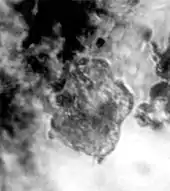 Endamoebites proterus |
Apicomplexa
Aconoidasida
Haemosporida
| Taxon | Authority | Year described | Notes | image |
|---|---|---|---|---|
|
Paleohaemoproteus burmacis[6] |
Poinar & Telford |
2005 |
A plasmodiid apicomplexan |
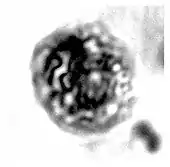 Paleohaemoproteus burmacis oocyst |
Conoidasida
Eugregarinorida
| Taxon | Authority | Year described | Notes | image |
|---|---|---|---|---|
|
Primigregarina burmanica[7] |
Poinar |
2010 |
A eugregarinorid apicomplexen gut protozoan of blattodeans |
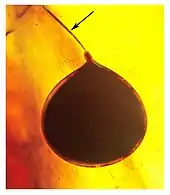 Primigregarina burmanica |
Euglenozoa
Kinetoplastea
Trypanosomatida
| Taxon | Authority | Year described | Notes | image |
|---|---|---|---|---|
|
Poinar |
2004 |
A trypanosomatid vector in Palaeomyia burmitis |
| |
|
Paleotrypanosoma burmanicus[8] |
Poinar |
2008 |
A trypanosomatid vector in Leptoconops nosopheris |
 Paleotrypanosoma burmanicus in Leptoconops nosopheris saliva |
Metamonada
Anaeromonadea
Oxymonadida
| Taxon | Authority | Year described | Notes | image |
|---|---|---|---|---|
|
Dinenymphites spiris[5] |
Poinar |
2009 |
A pyrsonymphid gut protozoan of Kachinitermopsis burmensis |
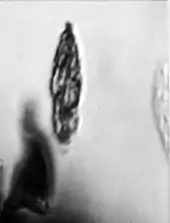 Dinenymphites spiris |
|
Microrhopalodites polynucleatis[5] |
Poinar |
2009 |
An oxymonadid gut protozoan of Kachinitermopsis burmensis |
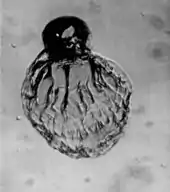 Microrhopalodites polynucleatis |
|
Oxymonas gigantea[9] |
Poinar |
2009 |
An oxymonadid gut protozoan of Blattarians |
|
|
Oxymonas protus[5] |
Poinar |
2009 |
An oxymonadid gut protozoan of Kachinitermopsis burmensis |
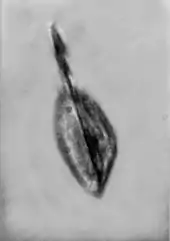 Oxymonas protus |
|
Oxymonites gerus[5] |
Poinar |
2009 |
An oxymonadid gut protozoan of Kachinitermopsis burmensis |
 Oxymonites gerus |
|
Pyrsonymphites cordylinis[5] |
Poinar |
2009 |
A pyrsonymphid gut protozoan of Kachinitermopsis burmensis |
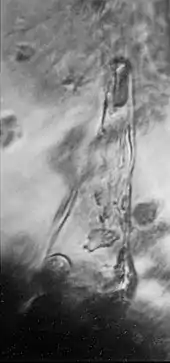 Pyrsonymphites cordylinis |
|
Sauromonites katatonis[5] |
Poinar |
2009 |
An oxymonadid gut protozoan of Kachinitermopsis burmensis |
 Sauromonites katatonis |
Trichonymphea
Trichonymphida
| Taxon | Authority | Year described | Notes | image |
|---|---|---|---|---|
|
Burmanymphus cretacea[9] |
Poinar |
2009 |
A burmanymphid gut protozoan of Blattarians |
|
|
Teranymphites rhabdotis[5] |
Poinar |
2009 |
A teranymphid gut protozoan of Kachinitermopsis burmensis |
 Teranymphites rhabdotis |
|
Trichonymphites henis[5] |
Poinar |
2009 |
A trichonymphid gut protozoan of Kachinitermopsis burmensis |
 Trichonymphites henis |
Trichomonadea
Cristamonadida
| Taxon | Authority | Year described | Notes | image |
|---|---|---|---|---|
|
Devescovites proteus[9] |
Poinar |
2009 |
A devescovinid gut protozoan of Blattarians |
|
|
Foainites icelus[9] |
Poinar |
2009 |
A devescovinid gut protozoan of Blattarians |
|
Spirotrichonymphida
| Taxon | Authority | Year described | Notes | image |
|---|---|---|---|---|
|
Spiromastigites acanthodes[5] |
Poinar |
2009 |
A holomastigotid gut protozoan of Kachinitermopsis burmensis |
 Spiromastigites acanthodes |
Trichomonadida
| Taxon | Authority | Year described | Notes | image |
|---|---|---|---|---|
|
Paleotrichomones burmanicus[9] |
Poinar |
2009 |
A trichomonadid gut protozoan of Blattarians |
|
"Opisthokonta"
Mesomycetozoea
Eccrinales
| Taxon | Authority | Year described | Notes | image |
|---|---|---|---|---|
|
Paleocadus burmiticus[10] |
Poinar |
2016 |
An eccrinacious Opisthokont |
|
Proteobacteria
Alphaproteobacteria
Rickettsiales
| Taxon | Authority | Year described | Notes | image |
|---|---|---|---|---|
|
Palaeorickettsia protera[11] |
Poinar |
2014 |
A Rickettsiaceae in Cornupalpatum burmanicum vector |
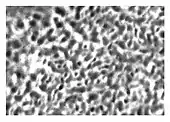 Palaeorickettsia protera |
Plants
Chlorophyte green algaes
Chaetophorales
| Taxon | Authority | Year described | Notes | image |
|---|---|---|---|---|
|
Electrophycus astroplethus[12] |
Poinar & Brown |
2020 |
A chaetophorale green algae |
|
Chlamydomonadales
| Ichnotaxon | Authority | Year described | Notes | image |
|---|---|---|---|---|
|
Chlamydomonas hanublikanus[13] |
Hinkelman & Vršanská |
2020 |
A chlamydomonadaceous green algae. |
|
Bryophyte true mosses
Dicranales
| Taxon | Authority | Year described | Notes | image |
|---|---|---|---|---|
|
Calymperites burmensis[14] |
Heinrichs et al. |
2014 |
A Dicranales moss of uncertain placement |
|
Hypnodendrales
| Taxon | Authority | Year described | Notes | image |
|---|---|---|---|---|
|
Vetiplanaxis espinosus[15] |
Hedenäs, Heinrichs, & Schmidt |
2014 |
A hypnodendralean moss |
|
|
Vetiplanaxis longiacuminatus[15] |
Hedenäs, Heinrichs, & Schmidt |
2014 |
A hypnodendralean moss |
|
|
Vetiplanaxis oblongus[15] |
Hedenäs, Heinrichs, & Schmidt |
2014 |
A hypnodendralean moss |
|
|
Vetiplanaxis obtusus[16] |
Li et al. |
2022 |
A hypnodendralean moss |
|
|
Vetiplanaxis pyrrhobryoides[15] |
Bell |
2007 |
A hypnodendralean moss |
|
Lycopods and spike mosses
| Taxon | Authority | Year described | Notes | image |
|---|---|---|---|---|
|
Selaginella alata[17] |
Li & Wang |
2022 |
A clubmoss |
|
|
Selaginella cretacea[18] |
Li et al. |
2022 |
A clubmoss |
|
Marchantiophyte liverworts
Porellales
| Taxon | Authority | Year described | Notes | image |
|---|---|---|---|---|
|
Frullania baerlocheri[19] |
Heinrichs et al. |
2011 |
A frullaniacious liverwort |
|
|
Frullania cretacea[20] |
Hentschel, Schmidt & Heinrichs |
2009 |
A frullaniacious liverwort |
|
|
Frullania kachinensis[21] |
Li et al. |
2021 |
A frullaniacious liverwort |
|
|
Frullania partita[22] |
Li et al. |
2020 |
A frullaniacious liverwort |
|
|
Frullania pinnata[23] |
Heinrichs, Feldberg, Schäfer-Verwimpe, & Krings |
2017 |
A frullaniacious liverwort |
|
|
Gackstroemia cretacea[24] |
Heinrichs, Schäfer-Verwimp, Feldberg, & A.R. Schmidt |
2017 |
A lepidolaenacious liverwort |
|
|
Protofrullania cornigera[25] |
Heinrichs |
2017 |
A frullaniacious liverwort |
|
|
Radula cretacea[26] |
Bechteler, Renner, Schäfer-Verwimp, & Heinrichs |
2017 |
A Radulaceae liverwort |
 Radula cretacea |
|
Radula heinrichsii[27] |
Feldberg et al. |
2021 |
A radulaceous liverwort |
|
|
Radula patrickmuelleri[28] |
Feldberg, Schäfer-Verwimp & Renner |
2022 |
A radulaceous liverwort |
|
|
Radula tanaiensis[28] |
Feldberg, Schäfer-Verwimp & Renner |
2022 |
A radulaceous liverwort |
|
Polypodiopsid ferns
Cyatheales
| Taxon | Authority | Year described | Notes | image |
|---|---|---|---|---|
|
Thyrsopteris cretacea[29] |
Li et al. |
2020 |
A thyrsopteridacious tree-fern |
|
|
Thyrsopteris cyathindusia[30] |
Zhang et al. |
2021 |
A thyrsopteridacious tree-fern |
|
Polypodiales
| Taxon | Authority | Year described | Notes | image |
|---|---|---|---|---|
|
Cladarastega burmanica[31] |
Poinar |
2021 |
A dennstaedtiaceous fern |
|
|
Cretacifilix fungiformis[32] |
Poinar & Buckley |
2008 |
A eupolypod fern |
|
|
Cystodium sorbifolioides[33] |
Regalado et al. |
2017 |
A Cystodiacious fern |
 Cystodium sorbifolioides |
|
Heinrichsia cheilanthoides[34] |
Regalado, Schmidt, Krings & Schneider |
2019 |
A pteridacious fern |
|
|
Holttumopteris burmensis[35] |
Regalado, Schneider, Krings, & Heinrichs |
2018 |
A fern of uncertain placement |
|
|
Hymenophyllites angustus[17] |
Li & Wang |
2022 |
||
|
Hymenophyllites kachinensis[17] |
Li & Wang |
2022 |
||
|
Hymenophyllites setosus[17] |
Li & Wang |
2022 |
||
|
Krameropteris resinatus[36] |
Schneider, Smith, & Heinrichs |
2016 |
A dennstaedtiacious fern |
|
|
Marsileaceaephyllum ciliatum[37] |
Wang et al. |
2021 |
A marsileaceous fern. |
|
|
Microlepia burmasia[38] |
Long, Wang & Shi in Long et al. |
2022 |
A species of Microlepia. |
|
|
Proodontosoria myanmarensis[39] |
Li et al. |
2020 |
A lindsaeacious fern |
|
Angiosperm flowering plants
Cornales
| Taxon | Authority | Year described | Notes | image |
|---|---|---|---|---|
|
Eoëpigynia burmensis[40] |
Poinar, Chamber & Buckley |
2007 |
A cornalean flower |
|
Laurales
| Taxon | Authority | Year described | Notes | image |
|---|---|---|---|---|
|
Cascolaurus burmitis[41] |
Poinar |
2017 |
A lauracious angiosperm |
|
|
Dispariflora robertae[42] |
Poinar & Chambers |
2019 |
A possible lauralean flower |
|
|
Jamesrosea burmensis[43] |
Crepet et al. |
2016 |
A mosaic laralean genus |
|
| Palaeoanthella huangii[44] |
Poinar & Chambers |
2005 |
A possible monimiacious angiosperm |
|
|
Zygadelphus aetheus[45] |
Poinar & Chambers |
2019 |
A possible lauralian of uncertain phylogenetic placement |
|
Liliales
| Taxon | Authority | Year described | Notes | image |
|---|---|---|---|---|
|
Mirafloris burmitis[46] |
Poinar |
2021 |
A lilialean flower. |
|
Nymphaeales
| Taxon | Authority | Year described | Notes | image |
|---|---|---|---|---|
|
Praenymphaeapollenites cenomaniensis[47] |
Barrón, Peris & Labandeira |
2020 |
Pollen of a member of Nymphaeaceae. |
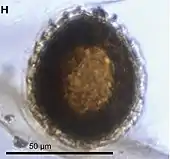 Praenymphaeapollenites cenomaniensis |
Oxalidales
| Taxon | Authority | Year described | Notes | image |
|---|---|---|---|---|
|
Tropidogyne euthystyla[48] |
Poinar, Chambers & Vega |
2021 |
A small flowered cunoniacious angiosperm. |
|
|
Tropidogyne lobodisca[49] |
Poinar & Chambers |
2019 |
A cunoniacious angiosperm. |
|
|
Tropidogyne pentaptera[50] |
Poinar & Chambers |
2017 |
A cunoniacious angiosperm. |
|
|
Tropidogyne pikei[51] |
Chambers, Poinar & Buckley |
2010 |
A cunoniacious angiosperm. |
|
Poales
| Taxon | Authority | Year described | Notes | image |
|---|---|---|---|---|
|
Programinis burmitis[52] |
Poinar |
2004 |
A poalean of uncertain placement |
|
|
Programinis laminatus[52] |
Poinar |
2004 |
A poalean of uncertain placement |
|
Rosales
| Taxon | Authority | Year described | Notes | image |
|---|---|---|---|---|
|
Eophylica priscastellata[53] |
Shi et al. |
2022 |
A rhamnaceous floral morphotaxon. |
|
|
Phylica piloburmensis[53] |
Shi et al. |
2022 |
A rhamnaceous floral morphotaxon. |
|
Incertae sedis
| Taxon | Authority | Year described | Notes | image |
|---|---|---|---|---|
|
Antiquifloris latifibris[54] |
Poinar, Buckley & Chen |
2016 |
An angiosperm of uncertain placement |
|
|
Chenocybus allodapus[55] |
Poinar |
2018 |
An angiosperm of uncertain placement |
|
|
Exalloanthum burmense[55] |
Poinar |
2018 |
An angiosperm of uncertain placement, |
|
|
Lachnociona terriae[57] |
Poinar, Chambers & Buckley |
2008 |
An angiosperm of uncertain placement |
|
|
Lijinganthus revoluta[58] |
Liu et al. |
2018 |
A core eudicot of uncertain placement |
 Lijinganthus revoluta |
|
Micropetasos burmensis[59] |
Poinar |
2004 |
An angiosperm of uncertain placement |
|
|
Rasenganus auricularus[60] |
Xing & Gu |
2020 |
A possible epizoochorous fruit. |
|
|
Strombothelya monostyla[61] |
Poinar & Chambers |
2019 |
An angiosperm of uncertain phylogenetic placement |
|
|
Strombothelya grammogyna[61] |
Poinar & Chambers |
2019 |
An angiosperm of uncertain phylogenetic placement |
|
Fungi
Ascomycota
Hypocreales
| Taxon | Authority | Year described | Notes | image |
|---|---|---|---|---|
|
Poinar & Buckley |
2007 |
A hypermycoparasitic fungus |
||
|
Poinar & Buckley |
2007 |
A hypermycoparasitic fungus |
||
|
Palaeoclaviceps parasiticus[63] |
Poinar, Alderman & Wunderlich |
2015 |
An ergot |
|
|
Paleoophiocordyceps coccophagus[64] |
Sung, Poinar & Spatafora |
2008 |
A parasite of a scale insect |
|
Ophiostomatales
| Taxon | Authority | Year described | Notes | image |
|---|---|---|---|---|
|
Paleoambrosia entomophila[65] |
Poinar & Vega |
2018 |
An ambrosia fungus associated with Palaeotylus femoralis. |
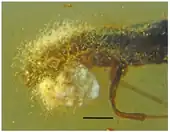 Paleoambrosia entomophila |
Basidiomycota
Agaricales
| Taxon | Authority | Year described | Notes | image |
|---|---|---|---|---|
|
Poinar & Buckley |
2007 |
An agaricale of uncertain placement |
| |
Boletales
| Taxon | Authority | Year described | Notes | image |
|---|---|---|---|---|
|
Palaeogaster micromorpha[66] |
Poinar, Alfredo & Baseia |
2014 |
A Boletale fungus |
 Palaeogaster micromorpha |
incertae sedis
| Taxon | Authority | Year described | Notes | image |
|---|---|---|---|---|
|
Palaeomycus epallelus[67] |
Poinar |
2018 |
A Pezizomycotina fungi |
|
|
Spheciophila adercia[68] |
Poinar |
2016 |
 Spheciophila adercia | |
"Zygomycetes"
Priscadvenales
| Taxon | Authority | Year described | Notes | image |
|---|---|---|---|---|
|
Priscadvena corymbosa[69] |
Poinar & Vega |
2019 |
A trichomycete |
 Priscadvena corymbosa |
Echinodermata
Crinoidea
Isocrinida
| Taxon | Authority | Year described | Notes | image |
|---|---|---|---|---|
|
Isocrinus cf. legeri[70] |
Salamon et al. |
2019 |
An Isocrinid crinoid, described from ossicles encased in the resin |
|
Arthropoda
Arachnida
Amblypygi
| Taxon | Authority | Year described | Notes | image |
|---|---|---|---|---|
|
Burmacharon dunlopi[71] |
Hu et al. |
2020 |
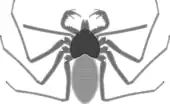 Burmacharon dunlopi | |
|
Kronocharon engeli[72] |
Wunderlich |
2015 |
A tailless whip scorpion of uncertain placement. |
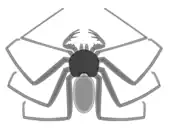 Kronocharon engeli |
|
Kronocharon longicalcaris[72] |
Wunderlich |
2015 |
A tailless whip scorpion of uncertain placement. |
 Kronocharon longicalcaris |
|
Kronocharon prendinii[73] |
Rossi & Merendino |
2016 |
A tailless whip scorpion of uncertain placement. |
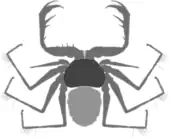 Kronocharon prendinii |
Araneae
| Taxon | Authority | Year described | Notes | image |
|---|---|---|---|---|
|
Aculeatosoma pyritmutatio[75] |
Wunderlich |
2017 |
||
|
Albiburmops annulipes[75] |
Wunderlich |
2017 |
||
|
Aliendiguetia praecursor[76] |
Wunderlich & Müller |
2020 |
A spider of uncertain phylogenetic placement, possibly related to the Ochyroceratoidea. |
|
|
Wunderlich |
2017 |
|||
|
Alteraraneus gracilipes[78] |
Wunderlich in Wunderlich & Müller |
2018 |
A zarqaraneid spider. |
|
|
Alterphyxioschemoides spicula[79] |
Wunderlich in Wunderlich & Müller |
2021 |
A curtain-web spider. |
|
|
Alteruloborus araneoides[78] |
Wunderlich in Wunderlich & Müller |
2018 |
An alteruloborid spider. |
|
|
Alticorona plenfemur[79] |
Wunderlich in Wunderlich & Müller |
2021 |
An armored spider. |
|
|
Archaelagonops propinquus[80] |
Wunderlich |
2015 |
||
|
Archaelagonops salticoides[81] |
Wunderlich |
2012 |
||
|
Archaelagonops scorsum[80] |
Wunderlich |
2015 |
||
|
Autotomiana brevisetosa[79] |
Wunderlich in Wunderlich & Müller |
2021 |
A pholcochyrocerid spider. |
|
|
Autotomiana hirsutipes[80] |
Wunderlich |
2015 |
A Pholcochyrocerid spider. |
|
|
Biapophyses beate[80] |
Wunderlich |
2015 |
A praeterleptonetid spider. |
|
|
Bicalamistrum mixtum[80] |
Wunderlich |
2015 |
||
|
Bicornoculus aungi[82] |
Jiang & Li in Xin et al. |
2022 |
An armored spider. |
|
|
Bicornoculus granulans[76] |
Wunderlich & Müller |
2020 |
An armored spider. |
|
|
Bicornoculus levis[80] |
Wunderlich |
2015 |
An armored spider. |
|
|
Bicornoculus wunnai[82] |
Jiang & Li in Xin et al. |
2022 |
An armored spider. |
|
|
Bicornoculus yarzari[82] |
Jiang & Li in Xin et al. |
2022 |
An armored spider. |
|
|
Boavista crassifemora[79] |
Wunderlich in Wunderlich & Müller |
2021 |
A cribellate orb weaver. |
|
|
Burlagonomegops eskovi[83] |
Penny |
2005 |
||
|
Burmadictyna clava[80] |
Wunderlich |
2015 |
||
|
Burmadictyna crassembolus[79] |
Wunderlich in Wunderlich & Müller |
2021 |
A salticoidid[79] deinopoid. |
|
|
Burmadictyna excavata[80] |
Wunderlich |
2015 |
||
|
Burmadictyna fissura[79] |
Wunderlich in Wunderlich & Müller |
2021 |
A salticoidid[79] deinopoid. |
|
|
Burmadictyna pectin[84] |
Wunderlich |
2008 |
||
|
Burmadictyna postcopula[75] |
Wunderlich |
2017 |
||
|
Burmadictyna similis[79] |
Wunderlich in Wunderlich & Müller |
2021 |
A salticoidid[79] deinopoid. |
|
|
Burmaforceps amputatus[78] |
Wunderlich in Wunderlich & Müller |
2018 |
A zarqaraneid spider. |
|
|
Burmascutum aenigma[84] |
Wunderlich |
2008 |
A burmascutid spider. |
|
|
Burmascutum brevis[78] |
Wunderlich |
2018 |
A burmascutid spider. |
|
|
Burmaspiralis trispinae[79] |
Wunderlich in Wunderlich & Müller |
2021 |
A zarqaraneid spider. |
|
|
Burmasuccinus bulla[78] |
Wunderlich in Wunderlich & Müller |
2018 |
A uloborid spider. |
|
|
Burmathele biseriata[75] |
Wunderlich |
2017 |
A burmathelid mesothele spider. |
|
|
Burmatheridion cetani[82] |
Jiang & Li in Xin et al. |
2022 |
A theridiid spider. |
|
|
Burmatheridion sinespinae[78] |
Wunderlich in Wunderlich & Müller |
2018 |
A theridiid spider. |
|
|
Burmesarchaea alissa[75] |
Wunderlich |
2017 |
An archaeid spider |
|
|
Burmesarchaea bilongapophyses[76] |
Wunderlich & Müller |
2020 |
An archaeid spider. |
|
|
Burmesarchaea caudata[75] |
Wunderlich |
2017 |
An archaeid spider |
|
|
Burmesarchaea crassicaput [75] |
Wunderlich |
2017 |
An archaeid spider |
|
|
Burmesarchaea crassichelae[75] |
Wunderlich |
2017 |
An archaeid spider |
|
|
Burmesarchaea gibber[75] |
Wunderlich |
2017 |
An archaeid spider |
|
|
Burmesarchaea gibberoides[75] |
Wunderlich |
2017 |
An archaeid spider |
|
|
Burmesarchaea gibbosa[75] |
Wunderlich |
2017 |
An archaeid spider |
|
|
(Penny) |
2003 |
An archaeid spider, |
||
|
Burmesarchaea longicollum[75] |
Wunderlich |
2017 |
An archaeid spider |
|
|
Burmesarchaea propinqua[75] |
Wunderlich |
2017 |
An archaeid spider |
|
|
Burmesarchaea pseudogibber[75] |
Wunderlich |
2017 |
An archaeid spider |
|
|
Burmesarchaea pustulata[75] |
Wunderlich |
2017 |
An archaeid spider |
|
|
Burmesarchaea quadrata[75] |
Wunderlich |
2017 |
An archaeid spider |
|
|
Burmesarchaea speciosa[75] |
(Wunderlich) |
2008 |
An archaeid spider, |
|
|
(Wunderlich & Müller) |
2020 |
A member of the family Nemesiidae |
||
|
Burmesiola cretacea[85] |
Wunderlich |
2011 |
||
|
Burmesiola daviesi[80] |
Wunderlich |
2015 |
||
|
?Burmesiola kachinensis[76] |
Wunderlich & Müller |
2020 |
A tree trunk spider. |
|
|
Burmorchestina acuminata[75] |
Wunderlich |
2017 |
||
|
Burmorchestina biangulata[75] |
Wunderlich |
2017 |
||
|
Burmorchestina bo[86] |
Jiang & Li in Xin et al. |
2021 |
A goblin spider. |
|
|
Burmorchestina circular[76] |
Wunderlich & Müller |
2020 |
A goblin spider. |
|
|
Burmorchestina convexa[86] |
Jiang & Li in Xin et al. |
2021 |
A goblin spider. |
|
|
Burmorchestina plana[75] |
Wunderlich |
2017 |
||
|
Burmorchestina pulcher[84] |
Wunderlich |
2008 |
||
|
Burmorchestina pulcheroides[75] |
Wunderlich |
2017 |
||
|
Burmorchestina tuberosa[75] |
Wunderlich |
2017 |
||
|
Wunderlich |
2015 |
Transferred to the separate genus Pseudorsolus in 2017, but moved back to the genus Burmorsolus in 2020. |
||
|
(Wunderlich) |
2017 |
Originally described as "Loxoderces" curvatus. |
||
|
Burmorsolus globosus[76] |
Wunderlich & Müller |
2020 |
||
|
Burmorsolus longembolus[76] |
Wunderlich & Müller |
2020 |
||
|
Burmorsolus longibulbus[76] |
Wunderlich & Müller |
2020 |
||
|
(Wunderlich) |
2017 |
Originally described as "Loxoderces" longicymbium. |
||
|
Burmorsolus longitibia[79] |
Wunderlich in Wunderlich & Müller |
2021 |
||
|
Burmorsolus nonplumosus[80] |
Wunderlich |
2015 |
Probably a relative of trogloraptorids.[76] |
|
|
(Wunderlich) |
2017 |
Originally described as "Loxoderces" rectus. |
||
|
Burmuloborus antefixus[80] |
Wunderlich |
2015 |
||
|
Burmuloborus parvus[84] |
Wunderlich |
2008 |
||
|
?Burmuloborus prolongatus[80] |
Wunderlich |
2015 |
A cribellate orb weaver of uncertain placement. |
|
|
Cethegoides patricki[75] |
Wunderlich |
2017 |
||
|
Converszarqaraneus annulipedes[78] |
Wunderlich in Wunderlich & Müller |
2018 |
A zarqaraneid spider. |
|
|
Cornicaraneus scutatus[78] |
Wunderlich in Wunderlich & Müller |
2018 |
A zarqaraneid spider. |
|
|
Cornutheridion concavum[79] |
Wunderlich in Wunderlich & Müller |
2021 |
A cobweb spider. |
|
|
Crassicephalus parvibulbus[79] |
Wunderlich in Wunderlich & Müller |
2021 |
A member of the group Deinopoidea belonging to the family Crassicephalidae. |
|
|
Crassitibia baculum[78] |
Wunderlich in Wunderlich & Müller |
2018 |
A zarqaraneid spider. |
|
|
Crassitibia longispina[80] |
Wunderlich |
2015 |
A zarqaraneid spider. |
|
|
Crassitibia sicilicula[79] |
Wunderlich in Wunderlich & Müller |
2021 |
A zarqaraneid spider. |
|
|
Crassitibia tenuimana[80] |
Wunderlich |
2015 |
A zarqaraneid spider. |
|
|
Cretaceothele lata[80] |
Wunderlich |
2015 |
A cretaceothelid Mesothelaen spider.[75] |
|
|
Cretamysmena fontana[78] |
Wunderlich in Wunderlich & Müller |
2018 |
A cretamysmenid spider. |
|
|
Cretotheridion champoi[82] |
Jiang & Li in Xin et al. |
2022 |
A cobweb spider. |
|
|
Cretotheridion inopinatum[80] |
Wunderlich |
2015 |
||
|
Curvitibia curima[80] |
Wunderlich |
2015 |
A zarqaraneid spider.[78] The type species is Curvitibia . |
|
|
Cymbioblemma corniger[75] |
Wunderlich |
2017 |
An armored spider. |
|
|
Cymbioblemma fusca[76] |
Wunderlich & Müller |
2020 |
An armored spider. |
|
|
Cymbioblemma hamoembolus[76] |
Wunderlich & Müller |
2020 |
An armored spider. |
|
|
Cymbioblemma ohnmari[82] |
Jiang & Li in Xin et al. |
2022 |
An armored spider. |
|
|
Cymbiolagonops cymbiocalcar[80] |
Wunderlich |
2015 |
||
|
Wunderlich |
2017 |
An eodeinopid[79] deinopoid spider. |
||
|
Dubiodeinopsis spinifemora[79] |
Wunderlich in Wunderlich & Müller |
2021 |
A member of the group Deinopoidea belonging to the family Dubiodeinopsidae. |
|
|
Dubiouloborix incompletus[79] |
Wunderlich in Wunderlich & Müller |
2021 |
A member of the group Deinopoidea belonging to the family Dubiouloboridae. |
|
|
Dubiouloborus praeta[79] |
Wunderlich in Wunderlich & Müller |
2021 |
A member of the group Deinopoidea belonging to the family Dubiouloboridae. |
|
|
Dubiouloborus procerembolus[79] |
Wunderlich in Wunderlich & Müller |
2021 |
A member of the group Deinopoidea belonging to the family Dubiouloboridae. |
|
|
Electroblemma bifida[87] |
Selden, Zhang & Ren |
2016 |
A tetrablemmid armored spider. |
|
|
Electroblemma bifurcata[76] |
Wunderlich & Müller |
2020 |
An armored spider. |
|
|
(Wunderlich) |
2017 |
An armored spider. |
||
|
Electroblemma caula[76] |
Wunderlich & Müller |
2020 |
An armored spider. |
|
|
(Wunderlich) |
2017 |
An armored spider. |
||
|
(Wunderlich) |
2017 |
An armored spider. |
||
|
Electroblemma pinnae[76] |
Wunderlich & Müller |
2020 |
An armored spider. |
|
|
Electroblemma spermaferens[79] |
Wunderlich in Wunderlich & Müller |
2021 |
An armored spider. |
|
|
Eoagelenomorphus cretaceus[79] |
Wunderlich in Wunderlich & Müller |
2021 |
A spider of uncertain phylogenetic placement, possibly a member of an early branch of the RTA clade. |
|
|
Eodeinopis longipes[75] |
Wunderlich |
2017 |
An eodeinopid[79] deinopoid spider. |
|
|
?Eogamasomorpha clara[80] |
Wunderlich |
2015 |
An armored spider of uncertain generic placement. |
|
|
Eogamasomorpha hamata[75] |
Wunderlich |
2017 |
An armored spider. |
|
|
Eogamasomorpha nubila[84] |
Wunderlich |
2008 |
||
|
Eogamasomorpha ohlhoffi[75] |
(Wunderlich) |
2011 |
An armored spider. |
|
|
Eogamasomorpha rostratis[76] |
Wunderlich & Müller |
2020 |
An armored spider. |
|
|
Eomesothele noninclinata[88] |
Wunderlich |
2019 |
An eomesothelid spider. |
|
|
Eomysmauchenius dubius[75] |
Wunderlich |
2017 |
A planarchaeid[79] palpimanoid spider. |
|
|
?Eomysmauchenius longissipes |
(Wunderlich) |
2015 |
A planarchaeid[79] palpimanoid spider, |
|
|
(Wunderlich) |
2017 |
A planarchaeid[79] palpimanoid spider, |
||
|
Eomysmauchenius septentrionalis[75] |
Wunderlich |
2008 |
A planarchaeid[79] palpimanoid spider |
|
|
Eopsiloderces filiformis[81] |
Wunderlich |
2012 |
An eopsilodercid spider. |
|
|
Eopsiloderces loxosceloides[84] |
Wunderlich |
2008 |
An eopsilodercid spider. |
|
|
Eopsiloderces serenitas[80] |
Wunderlich |
2015 |
An eopsilodercid spider. |
|
|
Eotibiaapophysis reliquus[78] |
Wunderlich in Wunderlich & Müller |
2018 |
A spider of uncertain phylogenetic placement, possibly a member of an early branch of the RTA clade.[79] |
|
|
Wunderlich |
2015 |
|||
|
Frateruloborus bulbosus[78] |
Wunderlich in Wunderlich & Müller |
2018 |
A frateruloborid spider. |
|
|
Furcembolus andersoni[84] |
Wunderlich |
2008 |
||
|
Furcembolus armatura[75] |
(Wunderlich) |
2015 |
A pacullid spider. |
|
|
Furcembolus biacuta[75] |
(Wunderlich) |
2015 |
A pacullid spider. |
|
|
Furcembolus chuandiani[89] |
Jiang & Li in Xin et al. |
2021 |
||
|
Furcembolus crassitibia[75] |
Wunderlich |
2017 |
||
|
Furcembolus dissolata[75] |
(Wunderlich) |
2015 |
A pacullid spider. |
|
|
Furcembolus equester[75] |
(Wunderlich) |
2015 |
A pacullid spider. |
|
|
Furcembolus fengzheni[89] |
Jiang & Li in Xin et al. |
2021 |
A pacullid spider. |
|
|
Furcembolus grossa[75] |
Wunderlich |
2017 |
||
|
Furcembolus inzaliae[82] |
Jiang & Li in Xin et al. |
2022 |
A pacullid spider. |
|
|
Furcembolus longior[75] |
Wunderlich |
2017 |
||
|
Furcembolus martensi[89] |
Jiang & Li in Xin et al. |
2021 |
A pacullid spider. |
|
|
Furcembolus tuberosa[75] |
(Wunderlich) |
2015 |
A pacullid spider. |
|
|
Gigarachne bian[90] |
Jiang & Li in Jiang et al. |
2020 |
A member of the group Araneomorphae of uncertain phylogenetic placement. |
|
|
Groehnianus burmensis[80] |
Wunderlich |
2015 |
A zarqaraneid spider.[78] |
|
|
Hamoderces opilionoides[76] |
Wunderlich & Müller |
2020 |
A spider belonging to the superfamily Scytodoidea and the family Praepholcidae. |
|
|
Hiatomegops spinalis[91] |
Guo, Selden & Ren |
2021 |
A lagonomegopid spider |
|
|
Hypotheridiosoma paracymbium[81] |
Wunderlich |
2012 |
A zarqaraneid spider.[78] |
|
|
Intermesothele pulcher[88] |
Wunderlich |
2019 |
An eomesothelid spider. |
|
|
Kachin fruticosoides[75] |
Wunderlich |
2017 |
||
|
Kachin fruticosus[75] |
Wunderlich |
2017 |
||
|
Kachin serratus[78] |
Wunderlich |
2018 |
||
|
Kachinarachne oblonga[79] |
Wunderlich in Wunderlich & Müller |
2021 |
A pholcochyrocerid spider. |
|
|
Lagonoburmops plumosus[81] |
Wunderlich |
2012 |
||
|
?Lagonomegops tuber[80] |
Wunderlich |
2015 |
A lagonomegopid spider of uncertain generic placement. |
|
|
Leviunguis altus[78] |
Wunderlich in Wunderlich & Müller |
2018 |
A leviunguid spider. |
|
|
Leviunguis anulus[78] |
Wunderlich in Wunderlich & Müller |
2018 |
A leviunguid spider. |
|
|
Leviunguis anulusoides[78] |
Wunderlich in Wunderlich & Müller |
2018 |
A leviunguid spider. |
|
|
Leviunguis bruckschi[81] |
Wunderlich |
2012 |
A leviunguid spider.[78] |
|
|
Leviunguis bruckschoides[78] |
Wunderlich in Wunderlich & Müller |
2018 |
A leviunguid spider. |
|
|
Leviunguis erectus[78] |
Wunderlich in Wunderlich & Müller |
2018 |
A leviunguid spider. |
|
|
Leviunguis glomulus[78] |
Wunderlich in Wunderlich & Müller |
2018 |
A leviunguid spider. |
|
|
Leviunguis glomus[78] |
Wunderlich in Wunderlich & Müller |
2018 |
A leviunguid spider. |
|
|
Leviunguis graciliembolus[78] |
Wunderlich in Wunderlich & Müller |
2018 |
A leviunguid spider. |
|
|
Leviunguis gradus[78] |
Wunderlich in Wunderlich & Müller |
2018 |
A leviunguid spider. |
|
|
Leviunguis porrigens[78] |
Wunderlich in Wunderlich & Müller |
2018 |
A leviunguid spider. |
|
|
Leviunguis pseudobruckschi[78] |
Wunderlich in Wunderlich & Müller |
2018 |
A leviunguid spider. |
|
|
Leviunguis quadratus[78] |
Wunderlich in Wunderlich & Müller |
2018 |
A leviunguid spider. |
|
|
Lineaburmops beigeli[80] |
Wunderlich |
2015 |
||
|
Lineaburmops hirsutipes[80] |
Wunderlich |
2015 |
||
|
Lineaburmops maculatus[75] |
Wunderlich |
2017 |
||
|
Longissipalpus cochlea[75] |
Wunderlich |
2017 |
||
|
Longissipalpus magnus[80] |
Wunderlich |
2015 |
||
|
Longissipalpus maior[80] |
Wunderlich |
2015 |
||
|
Longissipalpus minor[80] |
Wunderlich |
2015 |
||
|
Longissithorax myanmarensis[75] |
Wunderlich |
2017 |
An armored spider. |
|
|
Longithorax furca[75] |
Wunderlich |
2017 |
An armored spider. |
|
|
Magnosegestria tuber[76] |
Wunderlich & Müller |
2020 |
Probably a tube-dwelling spider. |
|
|
Micropalpimanus gibber[79] |
Wunderlich in Wunderlich & Müller |
2021 |
A micropalpimanid palpimanoid spider |
|
|
Micropalpimanus poinari[84] |
Wunderlich |
2008 |
A micropalpimanid palpimanoid spider |
|
|
Microproxiaraneus annulatus[78] |
Wunderlich in Wunderlich & Müller |
2018 |
A zarqaraneid spider. |
|
|
Microtheridion longissispinae[79] |
Wunderlich in Wunderlich & Müller |
2021 |
Probably a cobweb spider. |
|
|
Microuloborus birmanicus[80] |
Wunderlich |
2015 |
||
|
Microuloborus oblongus[79] |
Wunderlich in Wunderlich & Müller |
2021 |
A cribellate orb weaver. |
|
|
Myanlagonops gracilipes[81] |
Wunderlich |
2012 |
||
|
Myannemesia glaber[76] |
Wunderlich & Müller |
2020 |
A member of the family Nemesiidae. |
|
|
Myansegestria caederens[80] |
Wunderlich |
2015 |
||
|
Myansegestria engin[80] |
Wunderlich |
2015 |
||
|
Nephila burmanica[92] |
Poinar |
2012 |
A nephiline spider |
 Nephila burmanica |
|
Ocululoborus curvatus[81] |
Wunderlich |
2012 |
||
|
Odontomegops titan[94] |
Guo et al. |
2020 |
A lagonomegopid spider |
|
|
Orchestina globus[86] |
Jiang & Li in Xin et al. |
2021 |
A goblin spider. |
|
|
Palaeohygropoda myanmarensis[95] |
Penny |
2004 |
A palaeohygropodine praeterleptonetid spider |
|
|
Palaeoleptoneta calcar[81] |
Wunderlich |
2012 |
A leptonetid spider. |
|
|
Palaeoleptoneta crus[75] |
Wunderlich |
2017 |
A leptonetid spider. |
|
|
Palaeoleptoneta fissura[79] |
Wunderlich in Wunderlich & Müller |
2021 |
A leptonetid spider. |
|
|
Palaeoleptoneta nils[78] |
Wunderlich in Wunderlich & Müller |
2018 |
A leptonetid spider. |
|
|
Palaeoleptoneta thilo[78] |
Wunderlich in Wunderlich & Müller |
2018 |
A leptonetid spider. |
|
|
Palaeozearchaea depressa[79] |
Wunderlich in Wunderlich & Müller |
2021 |
A mecysmaucheniid spider. |
|
|
Palazarqaraneus hamulus[76] |
Wunderlich & Müller |
2020 |
A zarqaraneid spider. |
|
|
Palpalpaculla phyui[82] |
Jiang & Li in Xin et al. |
2022 |
An armored spider. |
|
|
Palpalpaculla pulcher[75] |
Wunderlich |
2017 |
An armored spider. |
|
|
Paramiagrammopes appendix[79] |
Wunderlich in Wunderlich & Müller |
2021 |
A cribellate orb weaver. |
|
|
Paramiagrammopes cretaceus[84] |
Wunderlich |
2008 |
||
|
Paramiagrammopes curvatus[79] |
Wunderlich in Wunderlich & Müller |
2021 |
A cribellate orb weaver. |
|
|
Paramiagrammopes furca[79] |
Wunderlich in Wunderlich & Müller |
2021 |
A cribellate orb weaver. |
|
|
Paramiagrammopes granulatus[79] |
Wunderlich in Wunderlich & Müller |
2021 |
A cribellate orb weaver. |
|
|
Paramiagrammopes inaequalis[79] |
Wunderlich in Wunderlich & Müller |
2021 |
A cribellate orb weaver. |
|
|
Paramiagrammopes inclinatus[79] |
Wunderlich in Wunderlich & Müller |
2021 |
A cribellate orb weaver. |
|
|
Paramiagrammopes longiclypeus[80] |
Wunderlich |
2015 |
||
|
Paramiagrammopes multifemurspinae[79] |
Wunderlich in Wunderlich & Müller |
2021 |
A cribellate orb weaver. |
|
|
Paramiagrammopes paracurvatus[79] |
Wunderlich in Wunderlich & Müller |
2021 |
A cribellate orb weaver. |
|
|
(Wunderlich) |
2017 |
A cribellate orb weaver. Originally described as Furculoborus patellaris. |
||
|
Paramiagrammopes patellidens[80] |
Wunderlich |
2015 |
||
|
Paramiagrammopes pilosus[79] |
Wunderlich in Wunderlich & Müller |
2021 |
A cribellate orb weaver. |
|
|
Paramiagrammopes pollex[79] |
Wunderlich in Wunderlich & Müller |
2021 |
A cribellate orb weaver. |
|
|
Paramiagrammopes pusillus[78] |
Wunderlich in Wunderlich & Müller |
2018 |
||
|
Paramiagrammopes semiapertus[79] |
Wunderlich in Wunderlich & Müller |
2021 |
A cribellate orb weaver. |
|
|
Paramiagrammopes simplex[79] |
Wunderlich in Wunderlich & Müller |
2021 |
A cribellate orb weaver. |
|
|
Paramiagrammopes sulcus[79] |
Wunderlich in Wunderlich & Müller |
2021 |
A cribellate orb weaver. |
|
|
Paramiagrammopes texter[79] |
Wunderlich in Wunderlich & Müller |
2021 |
A cribellate orb weaver. |
|
|
Paramiagrammopes unibrevispina[79] |
Wunderlich in Wunderlich & Müller |
2021 |
A cribellate orb weaver. |
|
|
(Wunderlich) |
2008 |
A cribellate orb weaver. Originally described as Palaeomiagrammopes vesica. |
||
|
Parvibulbus incompletus[78] |
Wunderlich in Wunderlich & Müller |
2018 |
A pholcochyrocerid. |
|
|
Parviburmops brevipalpus[80] |
Wunderlich |
2015 |
||
|
Parvispina tibialis[80] |
(Wunderlich) |
2011 |
A zarqaraneid spider.[78] |
|
|
Parvithele muelleri[75] |
Wunderlich |
2017 |
A parvithelid mesothelaen spider. |
|
|
Parvithele spinipes[75] |
Wunderlich |
2017 |
A parvithelid mesothelaen spider. |
|
|
Parvocteniza parvula[76] |
Wunderlich & Müller |
2020 |
A member of the family Ctenizidae. |
|
|
Parvosegestria longitibialis[80] |
Wunderlich |
2015 |
||
|
Parvosegestria obscura[80] |
Wunderlich |
2015 |
||
|
Parvosegestria pintgu[80] |
Wunderlich |
2015 |
||
|
(Wunderlich) |
2015 |
Originally described as "Denticulsegestria" rugosa. |
||
|
Parvosegestria triplex[80] |
Wunderlich |
2015 |
||
|
Paurospina curvata[78] |
Wunderlich in Wunderlich & Müller |
2018 |
A zarqaraneid spider. |
|
|
Paurospina fastigata[76] |
Wunderlich & Müller |
2020 |
A zarqaraneid spider. |
|
|
Paurospina fortis[78] |
Wunderlich in Wunderlich & Müller |
2018 |
A zarqaraneid spider. |
|
|
Paurospina paulocurvata[78] |
Wunderlich in Wunderlich & Müller |
2018 |
A zarqaraneid spider. |
|
|
?Paxillomegops cornutus[75] |
Wunderlich |
2017 |
A lagonomegopid spider of uncertain generic placement. |
|
|
?Paxillomegops brevipes[80] |
Wunderlich |
2015 |
A lagonomegopid spider of uncertain generic placement. |
|
|
Paxillomegops longipes[80] |
Wunderlich |
2015 |
||
|
Pedipalparaneus seldeni[80] |
Wunderlich |
2015 |
||
|
Pekkachilus vesica[75] |
Wunderlich |
2017 |
A vetiatorid spider. |
|
|
Pholcochyrocer altipecten[75] |
Wunderlich |
2017 |
A pholcochyrocerid spider. |
|
|
?Pholcochyrocer baculum[81] |
Wunderlich |
2012 |
A pholcochyrocerid spider of uncertain generic placement |
|
|
Pholcochyrocer calidum[78] |
Wunderlich in Wunderlich & Müller |
2018 |
A pholcochyrocerid spider. |
|
|
Pholcochyrocer guttulaeque[84] |
Wunderlich |
2008 |
A pholcochyrocerid spider. |
|
|
Pholcochyrocer pecten[81] |
Wunderlich |
2012 |
A pholcochyrocerid spider. |
|
|
Pholcochyrocer vermiculus[78] |
Wunderlich in Wunderlich & Müller |
2018 |
A pholcochyrocerid spider. |
|
|
Phyxioschemoides collembola[80] |
Wunderlich |
2015 |
||
|
Picturmegops signatus[80] |
Wunderlich |
2015 |
||
|
Pilosarachne ju[90] |
Jiang & Li in Jiang et al. |
2020 |
A member of the group Araneomorphae of uncertain phylogenetic placement, possibly a member of Deinopoidea.[79] |
|
|
Planarchaea incompleta[79] |
Wunderlich in Wunderlich & Müller |
2021 |
A planarchaeid[79] palpimanoid spider. |
|
|
Planarchaea kopp[80] |
Wunderlich |
2015 |
A planarchaeid[79] palpimanoid spider. |
|
|
Planarchaea oblonga[78] |
Wunderlich |
2017 |
A planarchaeid[79] palpimanoid spider. |
|
|
?Planarchaea paucidentata |
(Wunderlich) |
2008 |
A planarchaeid[79] palpimanoid spider, |
|
|
Planarchaea pilosa |
(Wunderlich) |
2015 |
A planarchaeid[79] palpimanoid spider, |
|
|
Planibulbus longisoma[78] |
Wunderlich in Wunderlich & Müller |
2018 |
A uloborid spider. |
|
|
Planimegops parvus[75] |
Wunderlich |
2017 |
||
|
Platythelae longicorpus[79] |
Wunderlich in Wunderlich & Müller |
2021 |
A planarchaeid palpimanoid spider. |
|
|
Praearaneus araneoides[76] |
Wunderlich & Müller |
2020 |
A praearaneid spider. |
|
|
Praearaneus bruckschi[75] |
Wunderlich |
2017 |
A praearaneid spider. |
|
|
Praepholcus huberi[75] |
Wunderlich |
2017 |
An eopsilodercid spider. |
|
|
Praeteraraneoides bifurcatum[78] |
Wunderlich in Wunderlich & Müller |
2018 |
A protoaraneoidid spider. |
|
|
Praeteraraneoides bipartitum[78] |
Wunderlich in Wunderlich & Müller |
2018 |
A protoaraneoidid spider. |
|
|
Praeteraraneoides leni[78] |
Wunderlich in Wunderlich & Müller |
2018 |
A protoaraneoidid spider. |
|
|
Praeterleptoneta spinipes[84] |
Wunderlich |
2008 |
A Praeterleptonetine praeterleptonetid spider |
|
|
Praetervetianus circulus[79] |
Wunderlich in Wunderlich & Müller |
2021 |
A vetiatorid palpimanoid spider. |
|
|
Priscaleclercera brevispinae[75] |
Wunderlich |
2017 |
||
|
Priscaleclercera chimei[82] |
Jiang & Li in Xin et al. |
2022 |
A psilodercid spider. |
|
|
Priscaleclercera christae[96] |
Magalhaes et al. |
2021 |
A psilodercid spider. |
|
|
Priscaleclercera ellenbergeri[75] |
(Wunderlich) |
2015 |
A psilodercid spider. |
|
|
Priscaleclercera foshou[82] |
Jiang & Li in Xin et al. |
2022 |
A psilodercid spider. |
|
|
Priscaleclercera furcata[76] |
Wunderlich & Müller |
2020 |
A psilodercid spider. |
|
|
Priscaleclercera hamo[76] |
Wunderlich & Müller |
2020 |
A psilodercid spider. |
|
|
Priscaleclercera hlaingi[82] |
Jiang & Li in Xin et al. |
2022 |
A psilodercid spider. |
|
|
Priscaleclercera kani[82] |
Jiang & Li in Xin et al. |
2022 |
A psilodercid spider. |
|
|
Priscaleclercera kyawae[82] |
Jiang & Li in Xin et al. |
2022 |
A psilodercid spider. |
|
|
Priscaleclercera liber[76] |
Wunderlich & Müller |
2020 |
A psilodercid spider. |
|
|
Priscaleclercera longissipes[75] |
(Wunderlich) |
2012 |
A psilodercid spider. |
|
|
Priscaleclercera paucispinae[75] |
Wunderlich |
2017 |
||
|
Priscaleclercera sexaculeata[75] |
(Wunderlich) |
2015 |
A psilodercid spider. "Leclercera" sexaculeata.[80] |
|
|
Priscaleclercera spicula[75] |
(Wunderlich) |
2012 |
A psilodercid spider. "Leclercera" spicula.[81] |
|
|
Priscaleclercera thanae[82] |
Jiang & Li in Xin et al. |
2022 |
A psilodercid spider. |
|
|
Priscaleclercera thaungi[82] |
Jiang & Li in Xin et al. |
2022 |
A psilodercid spider. |
|
|
Proaraneoides cribellatum[78] |
Wunderlich in Wunderlich & Müller |
2018 |
A protoaraneoidid spider. |
|
|
Proaraneoides lanceatum[79] |
Wunderlich in Wunderlich & Müller |
2021 |
A protoaraneoidid spider. |
|
|
Procerclypeus deformans[79] |
Wunderlich in Wunderlich & Müller |
2021 |
An armored spider. |
|
|
Procervetiator fruticosus[79] |
Wunderlich in Wunderlich & Müller |
2021 |
A vetiatorid palpimanoid spider. |
|
|
Propterkachin bispinatus[79] |
Wunderlich in Wunderlich & Müller |
2021 |
A cribellate orb weaver. |
|
|
Propterkachin magnoculus[75] |
Wunderlich |
2017 |
||
|
Propterpsiloderces crassitibia[76] |
Wunderlich & Müller |
2020 |
An eopsilodercid spider. |
|
|
Propterpsiloderces cymbioseta[76] |
Wunderlich & Müller |
2020 |
An eopsilodercid spider. |
|
|
Propterpsiloderces duplex[76] |
Wunderlich & Müller |
2020 |
An eopsilodercid spider. |
|
|
Propterpsiloderces longisetae[80] |
Wunderlich |
2015 |
An eopsilodercid spider.[76] |
|
|
Propterpsiloderces similis[79] |
Wunderlich in Wunderlich & Müller |
2021 |
An eopsilodercid spider. |
|
|
Protertheraphosa spinipes[76] |
Wunderlich & Müller |
2020 |
A tarantula. |
|
|
Protoaraneoides longispina[78] |
Wunderlich in Wunderlich & Müller |
2018 |
A protoaraneoidid spider. |
|
|
Proxiaraneus rarus[78] |
Wunderlich in Wunderlich & Müller |
2018 |
A zarqaraneid spider. |
|
|
Pseudokachin tuberculatus[79] |
Wunderlich in Wunderlich & Müller |
2021 |
A cribellate orb weaver. |
|
|
Pulvillothele haupti[75] |
Wunderlich |
2017 |
A parvithelid mesothelaen spider. |
|
|
Ramozarqaraneus pauxillus[78] |
Wunderlich in Wunderlich & Müller |
2018 |
A zarqaraneid spider. |
|
|
Retrooecobius chomskyi[80] |
Wunderlich |
2015 |
||
|
Retrooecobius convexus[80] |
Wunderlich |
2015 |
||
|
Retrooecobius lwini[82] |
Jiang & Li in Xin et al. |
2022 |
A disc web spider. |
|
|
Saetosoma filiembolus[81] |
Wunderlich |
2012 |
An armored spider. |
|
|
Scopomegops fax[91] |
Guo, Selden & Ren |
2021 |
A lagonomegopid spider |
|
|
Scutuloborella admirabilis[79] |
Wunderlich in Wunderlich & Müller |
2021 |
A member of the group Deinopoidea belonging to the family Scutuloboridae. |
|
|
Scutuloboroides pumilio[79] |
Wunderlich in Wunderlich & Müller |
2021 |
A member of the group Deinopoidea belonging to the family Scutuloboridae. |
|
|
Scutuloborus spiralembolus[79] |
Wunderlich in Wunderlich & Müller |
2021 |
A member of the group Deinopoidea belonging to the family Scutuloboridae. |
|
|
Spatiator putescens[80] |
Wunderlich |
2015 |
A spatiatorid spider. |
|
|
Spinasilia dissoluta[80] |
Wunderlich |
2015 |
||
|
Spiniarchaea aberrans[79] |
Wunderlich in Wunderlich & Müller |
2021 |
An archaeid spider. |
|
|
Spinicreber antiquus[80] |
Wunderlich |
2015 |
A pholcochyrocerid spider. |
|
|
Spinicreber vacuus[76] |
Wunderlich & Müller |
2020 |
A pholcochyrocerid spider. |
|
|
Spinicymbium curvimetatarsus[78] |
Wunderlich in Wunderlich & Müller |
2018 |
A zarqaraneid spider. |
|
|
Spinicymbium falcata[78] |
(Wunderlich) |
2015 |
A zarqaraneid spider. |
|
|
Spinicymbium unispina[79] |
Wunderlich in Wunderlich & Müller |
2021 |
A zarqaraneid spider. |
|
|
Spinipalpitibia hirsuta[78] |
Wunderlich in Wunderlich & Müller |
2018 |
A protoaraneoidid spider. |
|
|
Spinipalpitibia maior[80] |
Wunderlich |
2015 |
A protoaraneoidid spider. |
|
|
Spinipalpus vetus[80] |
Wunderlich |
2015 |
A pholcochyrocerid spider. |
|
|
Spiniuloborus crux[79] |
Wunderlich in Wunderlich & Müller |
2021 |
A cribellate orb weaver. |
|
|
?Telemofila ovalis[79] |
Wunderlich in Wunderlich & Müller |
2021 |
Possibly a species of Telemofila. |
|
|
Tenuicephalus penicillus[79] |
Wunderlich in Wunderlich & Müller |
2021 |
An armored spider. |
|
|
Triangulum thutai[82] |
Jiang & Li in Xin et al. |
2022 |
A theridiid spider. |
|
|
Unicornutiblemma brevicornis[76] |
Wunderlich & Müller |
2020 |
An armored spider. |
|
|
Unicornutiblemma gracilicornis[76] |
Wunderlich & Müller |
2020 |
An armored spider. |
|
|
Unicornutiblemma longicornis[76] |
Wunderlich & Müller |
2020 |
An armored spider. |
|
|
(Wunderlich) |
2017 |
An armored spider. |
||
|
Uniscutosoma aberrans[80] |
Wunderlich |
2015 |
An armored spider. |
|
|
Vetiator gracilipes[80] |
Wunderlich |
2015 |
A vetiatorid spider.[75] |
|
|
Zamilia aculeopectens[80] |
Wunderlich |
2015 |
||
|
Zamilia antecessor[84] |
Wunderlich |
2008 |
||
|
Zamilia arkari[82] |
Jiang & Li in Xin et al. |
2022 |
A disc web spider. |
|
|
Zamilia quattuormammillae[80] |
Wunderlich |
2015 |
||
|
Zamilia sheini[82] |
Jiang & Li in Xin et al. |
2022 |
A disc web spider. |
|
|
Zamilia shwayi[82] |
Jiang & Li in Xin et al. |
2022 |
A disc web spider. |
|
Ixodida
| Taxon | Authority | Year described | Notes | image |
|---|---|---|---|---|
|
Amblyomma birmitum[97] |
Chitimia-Dobler et al. |
2017 |
An ixodid hard tick. |
|
|
Cornupalpatum burmanicum[98] |
Poinar & Brown |
2003 |
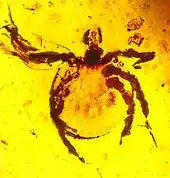 Cornupalpatum burmanicum | |
|
Deinocroton copia[99] |
Chitimia-Dobler, Mans & Dunlop in Chitimia-Dobler et al. |
2022 |
||
|
Deinocroton draculi[100] |
Peñalver, Arillo, Anderson & Pérez-de la Fuente |
2017 |
||
|
Haemaphysalis (Alloceraea) cretacea[101] |
Chitimia-Dobler, Pfeffer & Dunlop |
2018 |
||
|
Ixodes antiquorum[99] |
Chitimia-Dobler, Mans & Dunlop in Chitimia-Dobler et al. |
2022 |
A tick, a species of Ixodes. |
|
|
Khimaira fossus[99] |
Chitimia-Dobler, Mans & Dunlop in Chitimia-Dobler et al. |
2022 |
A tick combining a body resembling that of a soft tick with a basis capitulum more like that of a hard tick, assigned to a new family Khimairidae as a possible transitional form between soft and hard ticks. |
|
Opilioacariformes
| Taxon | Authority | Year described | Notes | image |
|---|---|---|---|---|
|
?Opilioacarus groehni[102] |
Dunlop & Bernardi |
2014 |
An opilioacarid mite. |
|
Opiliones
| Taxon | Authority | Year described | Notes | image |
|---|---|---|---|---|
|
Biungulus xiai[103] |
Bartel et al. |
2020 |
||
|
Ellenbergellus tuberculatus[103] |
Bartel et al. |
2020 |
A tithaeid harvestman. |
|
|
Gigantocheles nilsi[103] |
Bartel et al. |
2020 |
An epedanid armoured harvestman. |
|
|
Halitherses grimaldii[104] |
Giribet & Dunlop |
2005 |
||
|
Mesokanus oehmkuehnlei[103] |
Bartel et al. |
2020 |
A mesokanid laniatorean harvestman. |
|
|
Monooculricinuleus incisus[105] |
Wunderlich |
2017 |
A monooculricinuleid harvestman.[77] |
|
|
Monooculricinuleus semiglobosus[105] |
Wunderlich |
2017 |
A monooculricinuleid harvestman.[77] |
|
|
Palaeobeloniscus thilolebi[103] |
Bartel et al. |
2020 |
A beloniscid harvestman. |
|
|
Palaeosiro burmanicum[106] |
Poinar |
2008 |
||
|
Petrobunoides sharmai[107] |
Selden et al. |
2016 |
||
|
Protopyramidops nalae[103] |
Bartel et al. |
2020 |
Possibly a pyramidopid harvestman. |
|
Palpigradi
| Taxon | Authority | Year described | Notes | image |
|---|---|---|---|---|
|
Engel & Huang |
2016 |
A Eukoeneniid microwhip scorpion |
||
Pseudoscorpiones
| Taxon | Authority | Year described | Notes | image |
|---|---|---|---|---|
|
Amblyolpium burmiticum[109] |
(Cockerell) |
1920 |
A garypinid pseudoscorpion. |
|
|
Electrobisium acutum[110] |
Cockerell |
1917 |
||
|
Prionochthonius burmiticus[111] |
Wriedt et al. |
2021 |
A chthoniid pseudoscorpion |
|
|
Proalbiorix compactus[112] |
Geißler et al. |
2021 |
A pseudoscorpion belonging to the family Ideoroncidae. |
|
|
Proalbiorix gracilis[112] |
Geißler et al. |
2021 |
A pseudoscorpion belonging to the family Ideoroncidae. |
|
|
Procheiridium judsoni[113] |
Porta et al. |
2020 |
A cheiridiid pseudoscorpion. |
 Procheiridium judsoni |
|
Protofeaella peetersae[114] |
Henderickx in Henderickx & Boone |
2016 |
A pseudoscorpion of uncertain placement.[115] |
|
|
Weygoldtiella plausus[116] |
Harvey et al. |
2018 |
||
Ricinulei
| Taxon | Authority | Year described | Notes | image |
|---|---|---|---|---|
|
Hirsutisoma acutiformis[105] |
Wunderlich |
2017 |
A Hirsutisomid hooded tickspider. |
|
|
Hirsutisoma bruckschi[105] |
Wunderlich |
2017 |
A Hirsutisomid hooded tickspider. |
|
|
Hirsutisoma dentata[105] |
Wunderlich |
2017 |
A Hirsutisomid hooded tickspider. |
|
|
Hirsutisoma grimaldii[117] |
Botero-Trujillo et al. |
2022 |
A hirsutisomid hooded tickspider. |
|
|
?Poliochera cretacea[118] |
Wunderlich |
2012 |
A poliocherid hooded tickspider of uncertain generic placement. |
|
|
Primoricinuleus pugio[72] |
Wunderlich |
2015 |
A primoricinuleid hooded tickspider. |
|
Schizomida
| Taxon | Authority | Year described | Notes | image |
|---|---|---|---|---|
|
Annazomus parvulus[119] |
De Francesco Magnussen in De Francesco Magnussen et al. |
2022 |
A member of the family Hubbardiidae. |
|
|
Cretaceozomus angustocaudatus[119] |
De Francesco Magnussen in De Francesco Magnussen et al. |
2022 |
||
|
Cretaceozomus robustus[119] |
De Francesco Magnussen in De Francesco Magnussen et al. |
2022 |
||
|
Groehnizomus oculiferans[119] |
De Francesco Magnussen & Müller in De Francesco Magnussen et al. |
2022 |
||
|
Groehnizomus rodrigoi[119] |
Müller in De Francesco Magnussen et al. |
2022 |
||
|
Mesozomus groehni[120] |
Müller et al. |
2020 |
A short-tailed whip scorpion |
|
|
Muellerizomus amandae[119] |
De Francesco Magnussen & Müller in De Francesco Magnussen et al. |
2022 |
||
|
Muellerizomus palicaudatus[119] |
De Francesco Magnussen in De Francesco Magnussen et al. |
2022 |
||
Scorpiones
| Taxon | Authority | Year described | Notes | image |
|---|---|---|---|---|
|
Archaeoananteroides maderai[121] |
Lourenço & Velten |
2016 |
||
|
Archaeoscorpiops cretacicus[122] |
Lourenço |
2015 |
A palaeoeuscorpiid scorpion. |
|
|
Betaburmesebuthus bellus[123] |
Lourenço |
2016 |
A palaeoburmesebuthid scorpion. |
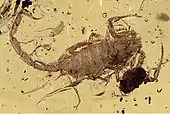 Betaburmesebuthus bellus |
|
Betaburmesebuthus bidentatus[124] |
Lourenço |
2015 |
||
|
Betaburmesebuthus fleissneri[125] |
Lourenço & Velten |
2016 |
||
|
Betaburmesebuthus joergi[126] |
Lourenço & Rossi |
2017 |
A palaeoburmesebuthid scorpion. |
|
|
Betaburmesebuthus kobberti[127] |
Lourenço |
2015 |
A palaeoburmesebuthid scorpion. |
|
|
Betaburmesebuthus larafleissnerae[128] |
Lourenço & Velten |
2016 |
A palaeoburmesebuthid scorpion. |
|
|
Betaburmesebuthus muelleri[124] |
Lourenço |
2015 |
A palaeoburmesebuthid scorpion. |
|
|
Burmesescorpiops groehni[129] |
Lourenço |
2016 |
An Archaeoscorpiopinae palaeoeuscorpiid scorpion. |
|
|
Chaerilobuthus birmanicus[130] |
Lourenço |
2015 |
A chaerilobuthid scorpion. |
|
|
Chaerilobuthus bruckschi[130] |
Lourenço |
2015 |
A chaerilobuthid scorpion. |
|
|
Chaerilobuthus complexus[131] |
Lourenço & Beigel |
2011 |
A chaerilobuthid scorpion. |
|
|
Chaerilobuthus enigmaticus[132] |
Lourenço |
2015 |
A chaerilobuthid scorpion. |
|
|
Chaerilobuthus gigantosternum[129] |
Lourenço |
2016 |
A chaerilobuthid scorpion. |
|
|
Chaerilobuthus knodelorum[133] |
Lourenço |
2018 |
A chaerilobuthid scorpion. |
|
|
Chaerilobuthus longiaculeus[134] |
Lourenço |
2013 |
A chaerilobuthid scorpion. |
|
|
Chaerilobuthus serratus[129] |
Lourenço |
2016 |
A chaerilobuthid scorpion. |
|
|
Chaerilobuthus schwarzi[135] |
Lourenço |
2015 |
A chaerilobuthid scorpion. |
|
|
Cretaceoushormiops knodeli[136] |
Lourenço |
2018 |
A protoischnurid scorpion. |
|
|
Cretaceousopisthacanthus smeelei[137] |
Lourenço in Lourenço & Velten |
2021 |
A protoischnurid scorpion. |
|
|
Electrochaerilus buckleyi[138] |
Santiago-Blay, Fet, Solegrad & Anderson |
2004 |
A chaerilid scorpion |
|
|
Palaeoburmesebuthus grimaldii[139] |
Lourenço |
2002 |
A palaeoburmesebuthid scorpion. |
|
|
Palaeoburmesebuthus knodeli[140] |
Lourenço |
2018 |
A palaeoburmesebuthid scorpion. |
|
|
Palaeoburmesebuthus longipalpis[126] |
Lourenço & Rossi |
2017 |
A palaeoburmesebuthid scorpion. |
|
|
Palaeoburmesebuthus ohlhoffi[130] |
Lourenço |
2015 |
A palaeoburmesebuthid scorpion. |
|
|
Palaeotrilineatus ellenbergeri[141] |
Lourenço |
2012 |
A palaeotrilineatid scorpion. |
|
|
Spinoburmesebuthus knodelorum[142] |
Lourenço |
2021 |
A palaeoburmesebuthid buthoidean scorpion. |
|
|
Spinoburmesebuthus pohli[143] |
Lourenço & Velten |
2017 |
A palaeoburmesebuthid buthoidean scorpion. |
|
|
Sucinlourencous adrianae[144] |
Rossi |
2015 |
A sucinlourencoid scorpion. |
|
Solifugae
| Taxon | Authority | Year described | Notes | image |
|---|---|---|---|---|
|
Cushingia ellenbergeri[145] |
Dunlop et al. |
2015 |
A solifuge of uncertain phylogenetic placement. |
|
Uropygi (Thelyphonida)
| Taxon | Authority | Year described | Notes | image |
|---|---|---|---|---|
|
Burmathelyphonia prima[72] |
Wunderlich |
2015 |
A whip scorpion of uncertain placement. |
|
|
Mesothelyphonus parvus[146] |
Cai & Huang |
2017 |
||
Trombidiformes
| Taxon | Authority | Year described | Notes | image |
|---|---|---|---|---|
|
Burerythrites pankowskii[147] |
Konikiewicz & Mąkol |
2018 |
An erythraeid mite. |
|
|
Burfessonia maryae[147] |
Konikiewicz & Mąkol |
2018 |
||
|
Burphanolophus joergwunderlichi[147] |
Konikiewicz & Mąkol |
2018 |
An erythraeid mite. |
|
|
Cheyletus burmiticus[148] |
Cockerell |
1917 |
||
|
Immensmaris chewbaccei[149] |
Dunlop, Frahnert & Mąkol |
2018 |
 Immensmaris chewbaccei | |
|
Nothrotrombidium myanmarum[147] |
Konikiewicz & Mąkol |
2018 |
A trombellid mite. |
|
|
Odontoscirus cretacico[150] |
Porta et al. |
2020 |
A bdellid mite. |
|
|
Procaeculus coineaui[151] |
Porta et al. |
2019 |
A caeculid mite. |
|
Incertae sedis
| Taxon | Authority | Year described | Notes | image |
|---|---|---|---|---|
|
Wang et al. |
2018 |
A stem-group spider |
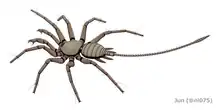 Chimerarachne yingi (artists reconstruction) | |
Diplopoda
Callipodida
| Taxon | Authority | Year described | Notes | image |
|---|---|---|---|---|
|
Stoev, Moritz & Wesener |
2019 |
| ||
Platydesmida
| Taxon | Authority | Year described | Notes | image |
|---|---|---|---|---|
|
Andrognathus burmiticus[154] |
Moritz & Wesener |
2019 |
||
Polyxenida
| Taxon | Authority | Year described | Notes | image |
|---|---|---|---|---|
|
Pauropsxenus extraneus[155] |
Su, Cai & Huang |
2020 |
||
|
Pauropsxenus ordinatus[155] |
Su, Cai & Huang |
2020 |
||
|
Phryssonotus burmiticus[148] |
Cockerell |
1917 |
||
Siphoniulida
| Taxon | Authority | Year described | Notes | image |
|---|---|---|---|---|
|
Siphoniulus muelleri[156] |
Liu, Rühr & Wesener |
2017 |
||
|
Siphoniulus preciosus[156] |
Liu, Rühr & Wesener |
2017 |
||
Siphonophorida
| Taxon | Authority | Year described | Notes | image |
|---|---|---|---|---|
|
Siphonophora hui[157] |
Jiang et al. |
2019 |
A siphonophorid sucking millipede. |
|
Spirostreptida
| Taxon | Authority | Year described | Notes | image |
|---|---|---|---|---|
|
Electrocambala cretacea[158] |
Moritz & Wesener |
2021 |
A member of Cambalidea. |
|
|
Electrocambala ornata[158] |
Moritz & Wesener |
2021 |
A member of Cambalidea. |
|
|
Kachincambala distorta[158] |
Moritz & Wesener |
2021 |
A member of Cambalidea. |
|
|
Kachincambala muelleri[158] |
Moritz & Wesener |
2021 |
A member of Cambalidea. |
|
"Entognatha"
Entomobryomorpha
| Taxon | Authority | Year described | Notes | image |
|---|---|---|---|---|
|
Burmisotoma lamellifera[159] |
Christiansen & Nascimbene |
2006 |
||
|
Cretacentomobrya burma[159] |
Christiansen & Nascimbene |
2006 |
||
|
Praentomobrya avita[159] |
Christiansen & Nascimbene |
2006 |
||
|
Proisotoma pettersonae[159] |
Christiansen & Nascimbene |
2006 |
||
|
Propachyotoma conica[159] |
Christiansen & Nascimbene |
2006 |
||
|
Protodesoria granda[159] |
Christiansen & Nascimbene |
2006 |
||
|
Protoisotoma burma[159] |
Christiansen & Nascimbene |
2006 |
||
|
Villusisotoma brevis[159] |
Christiansen & Nascimbene |
2006 |
||
|
Villusisotoma longa[159] |
Christiansen & Nascimbene |
2006 |
||
Poduromorpha
| Taxon | Authority | Year described | Notes | image |
|---|---|---|---|---|
|
Protodontella minicornis[159] |
Christiansen & Nascimbene |
2006 |
||
Symphypleona
| Taxon | Authority | Year described | Notes | image |
|---|---|---|---|---|
|
Grinnellia ventis[159] |
Christiansen & Nascimbene |
2006 |
||
|
Mucrovirga incompleta[159] |
Christiansen & Nascimbene |
2006 |
||
|
Sminthurconus grimaldi[159] |
Christiansen & Nascimbene |
2006 |
||
|
Sminthuricinus deceptus[159] |
Christiansen & Nascimbene |
2006 |
||
Insecta
Malacostraca
Decapoda
| Taxon | Authority | Year described | Notes | image |
|---|---|---|---|---|
|
Luque in Luque et al. |
2021 |
A crab belonging to the group Eubrachyura and to the family Cretapsaridae. |
||
|
Xiaopenaeus electrinus[161] |
Xing et al. |
2021 |
A member of the family Penaeidae. |
|
Isopoda
| Taxon | Authority | Year described | Notes | image |
|---|---|---|---|---|
|
Cryptolacruma nidis[162] |
Schädel et al. |
2021 |
A member of Epicaridea. |
|
|
Electrolana madelineae[163] |
Schädel, Hyžný & Haug |
2021 |
A member of Cymothoida. |
|
|
Myanmariscus deboiseae[164] |
Broly, Maillet & Ross |
2015 |
A possible styloniscid woodlouse.[165] |
|
|
Palaeoarmadillo microsoma[165] |
Poinar |
2018 |
An armadillid woodlouse. |
|
Ostracoda
| Taxon | Authority | Year described | Notes |
|---|---|---|---|
|
Myanmarcypris hui[166] |
Wang et al. |
2020 |
A candonid ostracod. |
|
Sanyuania sp.[166] |
Wang et al. |
2020 |
A loxoconchid cytheroid. |
|
Thalassocypria sp.[166] |
Wang et al. |
2020 |
A candonid ostracod. |
Symphyla
Scolopendrellidae
| Taxon | Authority | Year described | Notes | image |
|---|---|---|---|---|
|
Symphylella patrickmuelleri[167] |
Moritz & Wesener |
2017 |
||
Mollusca
Cephalopoda
Ammonitida
| Taxon | Authority | Year described | Notes | image |
|---|---|---|---|---|
|
N/A |
"2019" |
An immature Puzosia (Bhimaites) species dead shell |
| |
Gastropoda
"Architaenioglossa"
| Taxon | Authority | Year described | Notes | image |
|---|---|---|---|---|
|
Archaeocyclotus plicatula[169] |
Asato & Hirano in Hirano et al. |
2019 |
A cyclophorid land snail |
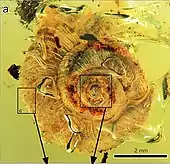 Archaeocyclotus plicatula |
|
Burminella artiukhini[170] |
Balashov, Perkovsky & Vasilenko |
2021 |
A land snail possessing morphological traits intermediate between members of the family Pupinidae and other members of Cyclophoroidea. |
|
|
Cretatortulosa cretakachinensis[171] |
Yu, Salvador & Jarzembowski |
2021 |
A pupinid land snail |
|
|
Cretatortulosa gignens[172] |
Jochum, Yu & Neubauer |
2021 |
A pupinid land snail |
|
|
Balashov |
2020 |
A diplommatinid land snail |
||
|
Euthema hesoana[169] |
Asato & Hirano in Hirano et al. |
2019 |
A diplommatinid land snail |
 Euthema hesoana |
|
Balashov, Perkovsky & Vasilenko |
2020 |
A diplommatinid land snail |
||
|
Hirsuticyclus electrum[175] |
Neubauer, Xing & Jochum |
2019 |
A cyclophorid land snail |
|
|
Lagocheilus cretaspira[169] |
Asato & Hirano in Hirano et al. |
2019 |
A cyclophorid land snail |
 Lagocheilus cretaspira |
|
Lagocheilus electrospira[169] |
Asato & Hirano in Hirano et al. |
2019 |
A cyclophorid land snail |
 Lagocheilus electrospira |
|
(Yu, Wang & Jarzembowski) |
2019 |
A cyclophorid land snail, |
||
|
(Yu, Wang & Jarzembowski) |
2019 |
A cyclophorid land snail, |
||
|
Pulchraspira teneristoma[171] |
Yu, Salvador & Jarzembowski |
2021 |
A diplommatinid land snail |
|
|
Rhaphaulus zhuoi[171] |
Yu, Salvador & Jarzembowski |
2021 |
A pupinid land snail |
|
|
Schistoloma electrothauma[169] |
Asato & Hirano in Hirano et al. |
2019 |
A pupinid land snail |
 Schistoloma electrothauma |
Heterobranchia
| Taxon | Authority | Year described | Notes | image |
|---|---|---|---|---|
|
Galba prima[178] |
Yu, Neubauer & Jochum |
2021 |
A species of Galba. |
|
|
N/A |
"2019" |
2 dead shells likely entombed as shoreline debris |
||
Littorinimorpha
| Taxon | Authority | Year described | Notes | image |
|---|---|---|---|---|
|
Assiminea striatura[179] |
Bullis et al. |
2020 |
An assimineid land snail |
|
|
Eotrichophorus kachin[179] |
Bullis et al. |
2020 |
An assimineid land snail |
|
|
Macropupina electricus[179] |
Bullis et al. |
2020 |
An assimineid land snail |
|
|
Paleodiplommatina spelomphalos[179] |
Bullis et al. |
2020 |
An assimineid land snail |
|
|
Perissocyclos kyrtostoma[179] |
Bullis et al. |
2020 |
An assimineid land snail |
|
|
Xenostoma lophopleura[179] |
Bullis et al. |
2020 |
An assimineid land snail |
|
Neritimorpha
| Taxon | Authority | Year described | Notes | image |
|---|---|---|---|---|
|
?Hydrocena praecursor[180] |
Yu & Neubauer |
2021 |
A member of the family Hydrocenidae. |
Bivalvia
| Taxon | Authority | Year described | Notes | image |
|---|---|---|---|---|
| Palaeolignopholas[181] | Bolotov et al. | 2021 | A member of the family Pholadidae |
Nematoda
Chromadorea
Rhabditida
| Taxon | Authority | Year described | Notes | image |
|---|---|---|---|---|
|
Cretodiplogaster termitophilous[182] |
Poinar |
2011 |
A rhabditid nematode of uncertain placement |
|
|
Palaeocosmocerca burmanica[182] |
Poinar |
2011 |
A cosmocercid nematode |
|
|
Proheterorhabditis burmanicus[182] |
Poinar |
2011 |
A heterorhabditid nematode |
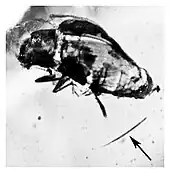 Proheterorhabditis burmanicus next to host beetle |
Enoplea
Mermithida
| Taxon | Authority | Year described | Notes | image |
|---|---|---|---|---|
|
Cretacimermis aphidophilus[183] |
Poinar |
2017 |
||
|
Cretacimermis chironomae[182] |
Poinar |
2011 |
||
|
Cretacimermis protus[184] |
Poinar & Buckley |
2006 |
||
Secernentea
Aphelenchida
| Taxon | Authority | Year described | Notes | image |
|---|---|---|---|---|
|
Cretaciaphelenchoides burmensis[182] |
Poinar |
2011 |
An aphelenchoidid nematode |
|
Oxyurida
| Taxon | Authority | Year described | Notes | image |
|---|---|---|---|---|
|
Paleothelastoma tipulae[182] |
Poinar |
2011 |
A thelastomatid nematode |
|
Nematomorpha
Gordioidea
| Taxon | Authority | Year described | Notes | image |
|---|---|---|---|---|
|
Cretachordodes burmitis[184] |
Poinar & Buckley |
2006 |
||
Onychophora
| Taxon | Authority | Year described | Notes | image |
|---|---|---|---|---|
|
Engel & Grimaldi |
2002 |
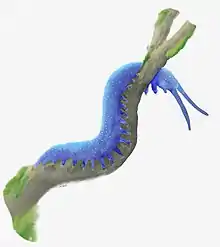 Cretoperipatus burmiticus (artist reconstruction) | ||
Vertebrata
Amphibia
Allocaudata
| Taxon | Authority | Year described | Notes | image |
|---|---|---|---|---|
|
Daza et al. |
2020 |
Figured in a 2016 as a Chameleonid. |
||
Anura
| Taxon | Authority | Year described | Notes | image |
|---|---|---|---|---|
|
Xing et al. |
2018 |
A tropical frog |
| |
Reptilia
Archosauria
| Taxon | Authority | Year described | Notes | image |
|---|---|---|---|---|
|
Xing et al. |
2016 |
Preserved tail with feathers |
||
|
Xing et al. |
2019 |
An enantiornithine avialan, |
||
|
Multiple |
Various |
Several partial wings and feet, |
||
|
Clark & O'Connor |
2021 |
An enantiornithine avialan. |
||
Squamata
| Taxon | Authority | Year described | Notes | image |
|---|---|---|---|---|
| Barlochersaurus winhtini[199] | Daza et al. | 2018 | A tiny (~ 2 cm long) possible stem-anguimorph | |
|
Arnold & Poinar |
2008 |
A gecko |
| |
|
Xing et al. |
2020 |
A lizard of uncertain placement.[202] |
||
|
Bolet et al. |
2021 |
|||
|
Protodraco monocoli[204] |
Wagner et al. |
2021 |
An agamid lizard |
|
|
Xiaophis myanmarensis[205] |
Xing et al. |
2018 |
||
| Squamata[185] | Daza et al. | 2016 | 13 Specimens of Squamate, varying from largely complete specimens to isolated limbs that were assigned to various families, one of which was later determined to be an albanerpetontid. | |
Ichnotaxa
Insecta
Dictyoptera
| Ichnotaxon | Authority | Year described | Notes | image |
|---|---|---|---|---|
|
Blattocoprolites mesoblattamaxi[13] |
Hinkelman in Hinkelman & Vršanská |
2020 |
A mesoblattinid cockroach coprolite. |
|
Mollusca
Bivalvia
| Ichnotaxon | Authority | Year described | Notes | image |
|---|---|---|---|---|
|
Teredolites clavatus |
n/a |
2018 |
pholadid burrowing crypts in the amber nodules, |
 Teredolites clavatus |
References
- ↑ Ross, A.J. 2018. Burmese (Myanmar) amber taxa, on-line checklist v.2018.2 104pp
- ↑ Ross, A.J. 2019b. Burmese (Myanmar) amber taxa, on-line supplement v.2019.2. 33pp.
- ↑ Poinar, G. O. Jr; Vega, F. E. (2021). "Mid-Cretaceous cellular slime mold (Eukarya: Dictyostelia?) in Burmese amber". Historical Biology: An International Journal of Paleobiology. 33 (5): 712–715. Bibcode:2021HBio...33..712P. doi:10.1080/08912963.2019.1658095. S2CID 202029760.
- ↑ Rikkinen, J.; Grimaldi, D. A.; Schmidt, A. R. (2019). "Morphological stasis in the first myxomycete from the Mesozoic, and the likely role of cryptobiosis". Scientific Reports. 9 (1): 19730. Bibcode:2019NatSR...919730R. doi:10.1038/s41598-019-55622-9. ISSN 2045-2322. PMC 6930221. PMID 31874965.
- 1 2 3 4 5 6 7 8 9 10 Poinar, G. O. Jr. (2009). "Description of an early Cretaceous termite (Isoptera: Kalotermitidae) and its associated intestinal protozoa, with comments on their co-evolution". Parasites & Vectors. 2 (12): 1–17. doi:10.1186/1756-3305-2-12. PMC 2669471. PMID 19226475.
- ↑ Poinar, G. O. Jr.; Telford, S. R. (2005). "Paleohaemoproteus burmacis gen. n., sp. n. (Haemospororida: Plasmodiidae) from an Early Cretaceous biting midge (Diptera: Ceratopogonidae)". Parasitology. 131 (1): 79–84. doi:10.1017/S0031182005007298. PMID 16038399. S2CID 23877176.
- ↑ Poinar, G. O. Jr. (2010). "Primigregarina burmanica n. gen., n. sp., an early cretaceous gregarine (Apicomplexa: Eugregarinorida) parasite of a cockroach (Insecta: Blattodea)". Fossil Behavior Compendium: 54–56.
- ↑ Poinar, G. O. Jr (2008). "Leptoconops nosopheris sp. n. (Diptera: Ceratopogonidae) and Paleotrypanosoma burmanicus gen. n., sp. n. (Kinetoplastida: Trypanosomatidae), a biting midge--trypanosome vector association from the Early Cretaceous". Memórias do Instituto Oswaldo Cruz. 103 (5): 468–71. doi:10.1590/s0074-02762008000500010. PMID 18797760.
- 1 2 3 4 5 Poinar, G. O. Jr. (2009). "Early Cretaceous protist flagellates (Parabasalia: Hypermatigia: Oxymonada) of cockroaches (Insecta: Blattaria) in Burmese amber". Cretaceous Research. 30 (5): 1066–1072. Bibcode:2009CrRes..30.1066P. doi:10.1016/j.cretres.2009.03.008.
- ↑ Poinar, G. O. Jr. (2016). "A mid-Cretaceous Eccrinales infesting a primitive wasp in Myanmar amber". Fungal Biology. 120 (12): 1537–1539. doi:10.1016/j.funbio.2016.08.001. PMID 27890089.
- ↑ Poinar, G. O. Jr. (2015). "Rickettsial-like cells in the Cretaceous tick, Cornupalpatum burmanicum (Ixodida: Ixodidae)". Cretaceous Research. 52, Part B: 623–627. Bibcode:2015CrRes..52..623P. doi:10.1016/j.cretres.2014.02.007.
- ↑ Poinar, G. O. Jr.; Brown, A. e. (2020). "A green algae (Chaetophorales: Chaetophoraceae) in Burmese amber". Historical Biology: An International Journal of Paleobiology. 33 (3): 323–327. doi:10.1080/08912963.2019.1616719. S2CID 182663732.
- 1 2 Hinkelman, J.; Vršanská, L. (2020). "A Myanmar amber cockroach with protruding feces contains pollen and a rich microcenosis". The Science of Nature. 107 (2): Article number 13. Bibcode:2020SciNa.107...13H. doi:10.1007/s00114-020-1669-y. PMID 32125545. S2CID 211730431.
- ↑ Heinrichs, J.; Schäfer-Verwimp, A.; Hedenäs, L.; Ignatov, M. S.; Schmidt, A. R. (2014). "An acrocarpous moss in Cretaceous amber from Myanmar". Cretaceous Research. 51: 260–265. Bibcode:2014CrRes..51..260H. doi:10.1016/j.cretres.2014.06.010.
- 1 2 3 4 Hedenäs, L.; Heinrichs, J.; Schmidt, A. R. (2014). "Bryophytes of the Burmese amber forest: amending and expanding the circumscription of the Cretaceous moss genus Vetiplanaxis". Review of Palaeobotany and Palynology. 209: 1–10. Bibcode:2014RPaPa.209....1H. doi:10.1016/j.revpalbo.2014.05.008.
- ↑ Li, Y.; Wang, Y.-D.; Feldberg, K.; Wang, S.; Shi, C.; Cui, Y.-M.; Zhang, X.-Q. (2022). "New insights into the moss genus Vetiplanaxis with a description of V. obtusus sp. nov. from the mid-Cretaceous Kachin amber, Myanmar". Review of Palaeobotany and Palynology. 301: Article 104659. Bibcode:2022RPaPa.30104659L. doi:10.1016/j.revpalbo.2022.104659. S2CID 247925481.
- 1 2 3 4 Li, Y.; Wang, Y.-D.; Nosova, N.; Lu, N.; Xu, Y.-Y. (2022). "Filmy Ferns (Hymenophyllaceae) and Associated Spike-Mosses (Selaginellaceae) from the Mid-Cretaceous Kachin Amber, Myanmar". Biology. 11 (11). 1629. doi:10.3390/biology11111629. PMC 9687414. PMID 36358330.
- ↑ Li, Y.; Li, Y.-D.; Wang, Y.-D.; Schneider, H.; Shi, G.-L. (2022). "Re-appraisal of lacewing mimicry of liverworts from the mid-Cretaceous Kachin amber, Myanmar with a description of Selaginella cretacea sp. nov. (Selaginellales, Selaginellaceae)". Cretaceous Research. 133: Article 105143. Bibcode:2022CrRes.13305143L. doi:10.1016/j.cretres.2022.105143. S2CID 245939368.
- ↑ Heinrichs, J.; Reiner-Drewald, M.E.; Feldberg, K.; von Konrat, M.; Hentschel, J.; Váňa, J.; Grimaldi, D.A.; Nascimbene, P.C.; Schmidt, A.R. (2011). "The leafy liverwort Frullania (Jungermanniopsida) in the Cretaceous amber forest of Myanmar". Review of Palaeobotany and Palynology. 169: 21–28. doi:10.1016/j.revpalbo.2011.10.002.
- ↑ Hentschel, J.; Schmidt, A. R.; Heinrichs, J. (2009). "Frullania cretacea, sp. nov. (Porellales, Jungermanniopsida), a leafy liverwort preserved in Cretaceous amber from Myanmar". Cryptogamie, Bryologie. 30 (3): 323–328.
- ↑ Li, Y.; Wang, Y.-D.; Feldberg, K.; Wang, Q.; Yang, X.-J. (2021). "A new leafy liverwort of Frullania (Frullaniaceae, Porellales) from the mid-Cretaceous Kachin amber, Myanmar". Geological Journal. 56 (10): 5046–5057. Bibcode:2021GeolJ..56.5046L. doi:10.1002/gj.4222. S2CID 238795680.
- ↑ Li, Y.; Wang, Y.-D.; Schnerder, H.; Wu, P.-C. (2020). "Frullania partita sp. nov. (Frullaniaceae, Porellales), a new leafy liverwort from the mid-Cretaceous of Myanmar". Cretaceous Research. 108: Article 104341. Bibcode:2020CrRes.10804341L. doi:10.1016/j.cretres.2019.104341. S2CID 213553976.
- ↑ Heinrichs, J.; Feldberg, K.; Müller, P.; Schäfer-Verwimpe, A.; von Konrat, M.; Ilsemann, B; Krings, M. (2017). "Frullania pinnata spec. nov. (Frullaniaceae, Porellales), a new leafy liverwort in mid-Cretaceous Burmese amber from Myanmar". Cretaceous Research. 78: 56–60. Bibcode:2017CrRes..78...56H. doi:10.1016/j.cretres.2017.05.030.
- ↑ Heinrichs, J.; Schäfer-Verwimp, A.; Feldberg, K.; Schmidt, A. R. (2014). "The extant liverwort Gackstroemia (Lepidolaenaceae, Porellales) in Cretaceous amber from Myanmar". Review of Palaeobotany and Palynology. 203: 48–52. Bibcode:2014RPaPa.203...48H. doi:10.1016/j.revpalbo.2014.01.004.
- ↑ Heinrichs, J.; Feldberg, K.; Bechteler, J.; Müller, P.; Renner, M. A.; Váňa, J.; Schäfer-Verwimp, A.; Schmidt, A. R. (2017). "A fossil genus of the Frullaniaceae (Porellales, Jungermanniopsida) from the mid-Cretaceous of Myanmar". Cretaceous Research. 74: 223–226. Bibcode:2017CrRes..74..223H. doi:10.1016/j.cretres.2017.02.023.
- ↑ Bechteler, J.; Schmidt, A. R.; Renner, M.A.; Wang, B.; Pérez-Escobar, O. A.; Schäfer-Verwimp, A.; Feldberg, K.; Heinrichs, J. (2017). "A Burmese amber fossil of Radula (Porellales, Jungermanniopsida) provides insights into the Cretaceous evolution of epiphytic lineages of leafy liverworts". Fossil Record. 20 (2): 201–213. Bibcode:2017FossR..20..201B. doi:10.5194/fr-20-201-2017.
- ↑ Feldberg, K.; Schäfer-Verwimp, A.; Renner, M. A. M.; von Konrat, M.; Bechteler, J.; Müller, P.; Wang, Y.-D.; Schneider, H.; Schmidt, A. R. (2021). "Liverworts from Cretaceous amber". Cretaceous Research. 128: Article 104987. Bibcode:2021CrRes.12804987F. doi:10.1016/j.cretres.2021.104987. S2CID 238782100.
- 1 2 Feldberg, K.; Schäfer-Verwimp, A.; Li, Y.; Renner, M. A. M. (2022). "Extending the diversity of the bryoflora in Kachin amber (Myanmar), with the description of Radula patrickmuelleri, sp. nov. and R. tanaiensis, sp. nov. (Jungermanniopsida, Porellales, Radulaceae)". Fossil Record. 25 (1): 213–230. doi:10.3897/fr.25.82362 (inactive 1 August 2023).
{{cite journal}}: CS1 maint: DOI inactive as of August 2023 (link) - ↑ Li, C.; Moran, R. C.; Ma, J.; Wang, B.; Hao, J.; Yang, Q. (2020). "A mid-Cretaceous tree fern of Thyrsopteridaceae (Cyatheales) preserved in Myanmar amber". Cretaceous Research. 105: Article 104050. Bibcode:2020CrRes.10504050L. doi:10.1016/j.cretres.2019.01.002.
- ↑ Zhang, H.-R.; Shi, C.; Long, X.-X.; Feng, Q.; Cai, H.-H.; Lü, Y.-T.; Wang, S. (2022). "A new fossil record of Thyrsopteridaceae (Cyatheales) from the mid-Cretaceous amber of Myanmar". Palaeoworld. 31 (3): 478–484. doi:10.1016/j.palwor.2021.09.002. S2CID 240519538.
- ↑ Poinar, G. (2021). "A new fern, Cladarastega burmanica gen. et sp. nov. (Dennstaedtiaceae: Polypodiales) in mid-Cretaceous Burmese amber". Palaeodiversity. 14 (1): 153–160. doi:10.18476/pale.v14.a7.
- ↑ Poinar, G.O.Jr.; Buckley, R. (2008). "Cretacifilix fungiformis gen. and sp. nov., an eupolypod fern (Polypodiales) in Early Cretaceous Burmese amber". Journal of the Botanical Research Institute of Texas. 2 (2): 1175–1182.
- ↑ Regalado, L.; Schmidt, A. R.; Appelhans, M. S.; Ilsemann, B.; Schneider, H.; Krings, M.; Heinrichs, J. (2017). "A fossil species of the enigmatic early polypod fern genus Cystodium (Cystodiaceae) in Cretaceous amber from Myanmar". Scientific Reports. 7 (1): 1–9. Bibcode:2017NatSR...714615R. doi:10.1038/s41598-017-14985-7. PMC 5668433. PMID 29097728.
- ↑ Regalado, L.; Schmidt, A. R.; Müller, P.; Niedermeier, L.; Krings, M.; Schneider, H. (2019). "Heinrichsia cheilanthoides gen. et sp. nov., a fossil fern in the family Pteridaceae (Polypodiales) from the Cretaceous amber forests of Myanmar". Journal of Systematics and Evolution. 57 (4): 329–338. doi:10.1111/jse.12514.
- ↑ Regalado, L.; Schmidt, A. R.; Krings, M.; Bechteler, J.; Schneider, H.; Heinrichs, J. (2018). "Fossil evidence of eupolypod ferns in the mid-Cretaceous of Myanmar". Plant Systematics and Evolution. 304 (1): 1–13. Bibcode:2018PSyEv.304....1R. doi:10.1007/s00606-017-1439-2. S2CID 21617872.
- ↑ Schneider, H.; Schmidt, A. R.; Heinrichs, J. (2016). "Burmese amber fossils bridge the gap in the Cretaceous record of polypod ferns". Perspectives in Plant Ecology, Evolution and Systematics. 18: 70–78. doi:10.1016/j.ppees.2016.01.003. hdl:10141/610456.
- ↑ Wang, S.; Long, X.; Zhang, H.; Cai, H.; Engel, M. S.; Shi, C. (2021). "A semi-aquatic fern (Marsileaceae) from the mid-Cretaceous amber of northern Myanmar". Cretaceous Research. 133: Article 105119. doi:10.1016/j.cretres.2021.105119. S2CID 245298780.
- ↑ Long, X.; Peng, Y.; Zhang, H.; Fan, Y.; Shi, C.; Wang, S. (2022). "Microlepia burmasia sp. nov., a new fern species from mid-Cretaceous Kachin amber of norther Myanmar (Dennstaedtiaceae, Polypodiales)". Cretaceous Research. 143. 105417. doi:10.1016/j.cretres.2022.105417. S2CID 253494172.
- ↑ Li, C.; Moran, R. C.; Ma, J.; Wang, B.; Hao, J. (2020). "A new fossil record of Lindsaeaceae (Polypodiales) from the mid-Cretaceous amber of Myanmar". Cretaceous Research. 105: Article 104040. Bibcode:2020CrRes.10504040L. doi:10.1016/j.cretres.2018.12.010.
- ↑ Poinar, G.; Chambers, K. L.; Buckley, R. (2007). "Eoëpigynia burmensis gen. and sp. nov., an Early Cretaceous eudicot flower (Angiospermae) in Burmese amber". Journal of the Botanical Research Institute of Texas: 91–96.
- ↑ Poinar, G. O. Jr (2017). "A mid-Cretaceous Lauraceae flower, Cascolaurus burmitis gen. et sp. nov., in Myanmar amber". Cretaceous Research. 71: 96–101. Bibcode:2017CrRes..71...96P. doi:10.1016/j.cretres.2016.11.015.
- ↑ Poinar, G. O. Jr.; Chambers, K. L. (2019). "Dispariflora robertae gen. et sp. nov., a mid-Cretaceous flower of possible Lauralean affinity from Myanmar amber". Journal of the Botanical Research Institute of Texas. 13 (1): 173–183. doi:10.17348/jbrit.v13.i1.839. S2CID 244510326.
- ↑ Crepet, W. L.; Nixon, K. C.; Grimaldi, D. A.; Riccio, M. (2016). "A mosaic Lauralean flower from the Early Cretaceous of Myanmar". American Journal of Botany. 103 (2): 290–297. doi:10.3732/ajb.1500393. PMID 26865118.
- ↑ Poinar, G. O. Jr; Chambers, K. L. (2005). "Palaeoanthella huangii gen. and sp. nov., an Early Cretaceous flower (Angiospermae) in Burmese amber". Sida. 21 (4): 2087–2092.
- ↑ Poinar, G. O. Jr; Chambers, K. L. (2019). "Zygadelphus aetheus gen. et sp. nov., an unusual fossil flower from mid-Cretaceous Myanmar amber". Journal of the Botanical Research Institute of Texas. 13 (2): 467–473. doi:10.17348/jbrit.v13.i2.799. S2CID 208232590.
- ↑ Poinar, G. O. (2021). "A Monocot Flower, Mirafloris burmitis gen. et sp. nov. (Monocots: Angiospermae), in Burmese Amber". Biosis: Biological Systems. 2 (3): 342–348. doi:10.37819/biosis.002.03.0126. S2CID 238732295.
- ↑ Peris, D.; Labandeira, C. C.; Barrón, E.; Delclòs, X.; Rust, J.; Wang, B. (2020). "Generalist pollen-feeding beetles during the mid-Cretaceous". iScience. 23 (3): Article 100913. Bibcode:2020iSci...23j0913P. doi:10.1016/j.isci.2020.100913. PMC 7113562. PMID 32191877.
- ↑ Poinar, G. O.; Chambers, K. L.; Vega, F. E. (2021). "Tropidogyne euthystyla sp. nov., a new small-flowered addition to the genus from mid-Cretaceous Myanmar amber". Journal of the Botanical Research Institute of Texas. 15 (1): 113–119. doi:10.17348/jbrit.v15.i1.1053. S2CID 237700194.
- ↑ Poinar, G. O. Jr; Chambers, K. L. (2019). "Tropidogyne lobodisca sp. nov., a third species of the genus from mid-Cretaceous Myanmar amber". Journal of the Botanical Research Institute of Texas. 13 (2): 461–466. doi:10.17348/jbrit.v13.i2.798. S2CID 244494400.
- ↑ Poinar, G. O. Jr; Chambers, K. L. (2017). "Tropidogyne pentaptera, sp. nov., a new mid-Cretaceous fossil angiosperm flower in Burmese amber". Palaeodiversity. 10 (1): 135–140. doi:10.18476/pale.v10.a10.
- ↑ Chambers, K. L.; Poinar, G. O. Jr; Buckley, R. (2010). "Tropidogyne a new genus of Early Cretaceous eudicots (Angiospermae) from Burmese amber". Novon. 20 (1): 23–29. doi:10.3417/2008039. S2CID 86227328.
- 1 2 Poinar, G. O. Jr (2004). "Programinis burmitis gen. et sp. nov., and P. laminatus sp. nov., Early Cretaceous grass-like monocots in Burmese amber". Australian Systematic Botany. 17 (5): 497–504. doi:10.1071/SB04002.
- 1 2 Shi, C.; Wang, S.; Cai, H.; Zhang, H.; Long, X.; Tihelka, E.; Song, W.; Feng, Q.; Jiang, R.; Cai, C.; Lombard, N.; Li, X.; Yuan, J.; Zhu, J.; Yang, H.; Liu, X.; Xiang, Q.; Zhao, Z.; Long, C.; Schneider, H.; Zhang, X.; Peng, H.; Li, D.-Z.; Fan, Y.; Engel, M. S.; Wang, Y.; Spicer, R. A. (2022). "Fire-prone Rhamnaceae with South African affinities in Cretaceous Myanmar amber". Nature Plants. 8 (2): 125–135. doi:10.1038/s41477-021-01091-w. PMID 35102275. S2CID 246443363.
- ↑ Poinar, G. O. Jr.; Buckley, R.; Chen, H. (2016). "A primitive Mid-Cretaceous angiosperm flower, Antiquifloris latifibris gen. & sp. nov., in Myanmar amber". Journal of the Botanical Research Institute of Texas. 10 (1): 155–162.
- 1 2 George Poinar, Jr. (2018). "Mid-Cretaceous angiosperm flowers in Myanmar amber". In Beatrice Welch; Micheal Wilkerson (eds.). Recent advances in plant research. Nova Science Publishers, Incorporated. pp. 187–218. ISBN 978-1-53614-170-2.
- ↑ Poinar, G. O. Jr (2019). "Exalloanthum, a new name for a fossil angiosperm flower in Myanmar amber". Journal of the Botanical Research Institute of Texas. 13 (2): 475–476. doi:10.17348/jbrit.v13.i2.800. S2CID 244521650.
- ↑ Poinar, G. O. Jr; Chambers, K. L.; Buckley, R. (2008). "An early Cretaceous angiosperm fossil of possible significance in rosid floral diversification". Journal of the Botanical Research Institute of Texas. 2 (2): 1183–1192.
- ↑ Liu, Z.-J.; Huang, D.; Cai, C.; Wang, X. (2018). "The core eudicot boom registered in Myanmar amber". Scientific Reports. 8 (1): Article number 16765. Bibcode:2018NatSR...816765L. doi:10.1038/s41598-018-35100-4. PMC 6233203. PMID 30425298.
- ↑ Poinar, G. O. Jr.; Chambers, K. L.; Wunderlich, J. (2013). "Micropetasos, a new genus of angiosperms from mid-cretaceous Burmese amber". Journal of the Botanical Research Institute of Texas. 7 (2): 745–750.
- ↑ Xing, L.; Gu, L. (2020). "The possible earliest epizoochorous fruit preserved in mid-Cretaceous Burmese amber". Cretaceous Research. 114: Article 104498. Bibcode:2020CrRes.11404498X. doi:10.1016/j.cretres.2020.104498. S2CID 219439641.
- 1 2 Poinar, G. O. Jr; Chambers, K. L. (2019). "Strombothelya gen. nov., a fossil angiosperm with two species in mid-Cretaceous Myanmar amber". Journal of the Botanical Research Institute of Texas. 13 (2): 451–460. doi:10.17348/jbrit.v13.i2.797. S2CID 244510839.
- 1 2 3 Poinar, G.O.; Buckley, R. (2007). "Evidence of mycoparasitism and hypermycoparasitism in Early Cretaceous amber". Mycological Research. 111 (4): 503–506. doi:10.1016/j.mycres.2007.02.004. PMID 17512712.
- ↑ Poinar, G. J.; Alderman, S.; Wunderlich, J. (2015). "One hundred million year old ergot: psychotropic compounds in the Cretaceous". Palaeodiversity. 8: 13–19.
- ↑ Sung, G. H.; Poinar, G. O.; Spatafora, J. W. (2008). "The oldest fossil evidence of animal parasitism by fungi supports a Cretaceous diversification of fungal–arthropod symbioses". Molecular Phylogenetics and Evolution. 49 (2): 495–502. doi:10.1016/j.ympev.2008.08.028. PMID 18817884.
- ↑ Poinar, G. O. Jr.; Vega, F. E. (2018). "A mid-Cretaceous ambrosia fungus, Paleoambrosia entomophila gen. nov. et sp. nov. (Ascomycota: Ophiostomatales) in Burmese (Myanmar) amber, and evidence for a femoral mycangium". Fungal Biology. 122 (12): 1159–1162. doi:10.1016/j.funbio.2018.08.002. PMID 30449353. S2CID 53950691.
- ↑ Poinar Jr, G. O.; da Silva Alfredo, D.; Baseia, I. G. (2014). "A gasteroid fungus, Palaeogaster micromorpha gen. & sp. nov.(Boletales) in Cretaceous Myanmar amber". Journal of the Botanical Research Institute of Texas. 8 (1): 139–143.
- ↑ Poinar, G. O. (2018). "A mid-Cretaceous pycnidia, Palaeomycus epallelus gen. et sp. nov., in Myanmar amber". Historical Biology. 38: 1–4. doi:10.1080/08912963.2018.1446531. S2CID 90373037.
- ↑ "Spheciophila". www.mycobank.org. Retrieved 2020-02-26.
- ↑ Poinar, G. O. Jr; Vega, F. E. (2019). "A mid-Cretaceous trichomycete, Priscadvena corymbosa gen. et sp. nov., in Burmese amber". Fungal Biology. 123 (5): 393–396. doi:10.1016/j.funbio.2019.02.007. PMID 31053328. S2CID 92176165.
- ↑ Salamon, M. A.; Lin, J.; Duda, P.; Gorzelak, P.; Ausich, W. I.; Oji, T. (2019). "Paleoenvironmental and biostratigraphic implications of echinoderm ossicles trapped within Burmese amber". PALAIOS. 34 (12): 652–656. Bibcode:2019Palai..34..652S. doi:10.2110/palo.2019.084. S2CID 209473464.
- ↑ Hu, X.; Lei, X.; Luo, C.; Jarzembowski, E.A.; Wang, B.; Xiao, C. (2020). "A new whip spider (Arachnida: Amblypygi) in mid-Cretaceous Kachin amber". Cretaceous Research. 116: Article 104596. Bibcode:2020CrRes.11604596H. doi:10.1016/j.cretres.2020.104596. S2CID 225379275.
- 1 2 3 4 Wunderlich, J. (2015). "New and rare fossil Arachnida in Cretaceous Burmese Amber (Amblypygi, Ricinulei and Uropygi: Thelephonida)" (PDF). In Jörg Wunderlich (ed.). Beiträge zur Araneologie, 9: Mesozoic spiders and other fossil arachnids. pp. 409–436.
- ↑ Engel, M.; Grimaldi, D. (2014). "Whipspiders (Arachnida: Amblypygi) in amber from the Early Eocene and mid-Cretaceous, including maternal care". Novitates Paleoentomologicae. 9: 1–17.
- ↑ Rossi, A.; Merendino, H. (2016). "Una nuova sottospecie di amblipigio dall'ambra birmana del Myanmar (Amblypygi)". Arachnida – Rivista Aracnologica Italiana. 9: 30–32.
- 1 2 3 4 5 6 7 8 9 10 11 12 13 14 15 16 17 18 19 20 21 22 23 24 25 26 27 28 29 30 31 32 33 34 35 36 37 38 39 40 41 42 43 44 45 46 47 48 49 50 51 52 53 54 55 56 57 58 59 60 61 62 63 64 65 66 67 68 69 70 71 72 73 74 75 76 Wunderlich, J. (2017). "New and rare fossil spiders (Araneae) in mid Cretaceous amber from Myanmar (Burma), including the description of new extinct families of the suborders Mesothelae and Opisthothelae as well as notes on the taxonomy, the evolution and the biogeography of the Mesothelae" (PDF). In Jörg Wunderlich (ed.). Beiträge zur Araneologie, 10. pp. 72–279.
- 1 2 3 4 5 6 7 8 9 10 11 12 13 14 15 16 17 18 19 20 21 22 23 24 25 26 27 28 29 30 31 32 33 34 35 36 37 38 39 40 41 42 43 44 Wunderlich, J.; Müller, P. (2020). "New and already described fossil spiders (Araneae) of 20 families in mid and Late Cretaceous Burmese ambers, with notes on spider phylogeny, evolution and classification" (PDF). In Jörg Wunderlich (ed.). Beiträge zur Araneologie, 13. Self published. pp. 22–164. ISBN 978-3-931473-19-8.
- 1 2 3 4 Paul A. Selden; Dong Ren (2017). "A review of Burmese amber arachnids". Journal of Arachnology. 45 (3): 324–343. doi:10.1636/JoA-S-17-029. S2CID 90983791.
- 1 2 3 4 5 6 7 8 9 10 11 12 13 14 15 16 17 18 19 20 21 22 23 24 25 26 27 28 29 30 31 32 33 34 35 36 37 38 39 40 41 42 43 44 45 46 47 48 49 50 51 52 53 Jörg Wunderlich; Patrick Müller (2018). "Reflections on the origin of the orb web, on the evolution and the relationships of selected spiders (Araneae): the RTA-clade, the superfamily Leptonetoidea as well as on the orb-weaving spiders (Araneoidea and Deinopoidea), based on "missing links" in Cretaceous Burmese amber; descriptions of new taxa, and notes on the spider fauna in Burmite" (PDF). In Jörg Wunderlich (ed.). Beiträge zur Araneologie, 11. Fossil spiders (Araneae) in Cretaceous Burmese amber. Publishing House Joerg Wunderlich. pp. 1–177. ISBN 978-3-931473-16-7.
- 1 2 3 4 5 6 7 8 9 10 11 12 13 14 15 16 17 18 19 20 21 22 23 24 25 26 27 28 29 30 31 32 33 34 35 36 37 38 39 40 41 42 43 44 45 46 47 48 49 50 51 52 53 54 55 56 57 58 59 60 61 62 63 64 65 66 67 68 69 70 71 72 73 74 75 76 77 78 79 80 Wunderlich, J.; Müller, P. (2021). "Description of new fossil spiders (Araneae) in Late (mid) Cretaceous Burmese (Kachin) amber with focus on the superfamilies Palpimanoidea and Deinopoidea and members of the RTA-clade, as well as remarks on palaeobehaviour, palaeofauna, taxonomy and phylogenetics" (PDF). In Jörg Wunderlich (ed.). Beiträge zur Araneologie, 14. pp. 25–262. ISBN 978-3-931473-20-1.
{{cite book}}: Check|isbn=value: checksum (help) - 1 2 3 4 5 6 7 8 9 10 11 12 13 14 15 16 17 18 19 20 21 22 23 24 25 26 27 28 29 30 31 32 33 34 35 36 37 38 39 40 41 42 43 44 45 46 47 48 49 50 51 52 53 54 55 56 57 58 59 60 61 62 63 64 65 Wunderlich, J. (2015). "On the evolution and the classification of spiders, the Mesozoic spider faunas, and descriptions of new Cretaceous taxa mainly in amber from Myanmar (Burma) (Arachnida: Araneae)" (PDF). In Jörg Wunderlich (ed.). Beiträge zur Araneologie, 9: Mesozoic spiders and other fossil arachnids. pp. 21–408.
- 1 2 3 4 5 6 7 8 9 10 11 12 13 Wunderlich, J. (2012). "On the fossil spider (Araneae) fauna in Cretaceous ambers, with descriptions of new taxa from Myanmar (Burma) and Jordan, and on the relationships of the superfamily Leptonetoidea" (PDF). In Jörg Wunderlich (ed.). Beiträge zur Araneologie, 7: Fifteen papers on extant and fossil spiders (Araneae). pp. 157–232.
- 1 2 3 4 5 6 7 8 9 10 11 12 13 14 15 16 17 18 19 20 Xin, Y.; Jiang, T.; Yao, Z.; Li, S. (2022). "Twenty new spider species (Arachnida: Araneae) from Late Cretaceous Kachin amber (Myanmar)". Zoological Systematics. 47 (1): 1–65. doi:10.11865/zs.2022101.
- ↑ Penney, P. (2005). "The fossil spider family Lagonomegopidae". The Journal of Arachnology. 33: 439–444. doi:10.1636/04-55.1. S2CID 86341553.
- 1 2 3 4 5 6 7 8 9 10 11 12 13 14 Wunderlich, J (2008). "The dominance of ancient spider families of the Araneae: Haplogynae in the Cretaceous, and the late diversification of the advanced ecribellate spiders of the Entelegynae after the Cretaceous-Tertiary boundary extinction events, with descriptions of new families". Beiträge zur Araneologie. 5: 524–674, 802–813.
- 1 2 Wunderlich, J. (2011). "Some fossil spiders (Araneae) in Cretaceous ambers". In Jörg Wunderlich (ed.). Beiträge zur Araneologie, 6. pp. 539–557.
- 1 2 3 Xin, Y.; Jiang, T.; Tong, Y.; Yao, Z.; Li, S. (2021). "The oonopid spiders from mid-Cretaceous Burmese amber of northern Myanmar, with descriptions of three new species". Cretaceous Research. 127: Article 104917. Bibcode:2021CrRes.12704917X. doi:10.1016/j.cretres.2021.104917.
- ↑ Selden, P. A.; Zhang, W.; Ren, D. (2016). "A bizarre armoured spider (Araneae: Tetrablemmidae) from Upper Cretaceous Myanmar amber". Cretaceous Research. 66: 129–135. Bibcode:2016CrRes..66..129S. doi:10.1016/j.cretres.2016.06.007.
- 1 2 Wunderlich, J. (2019). "What is a spider? Cretaceous fossils modify strongly phylogenetics as well as diagnoses of families, superfamilies and even suborders of spiders (Araneida) and other arthropods" (PDF). In Jörg Wunderlich (ed.). Beiträge zur Araneologie, 12. pp. 1–32.
- 1 2 3 4 Xin, Y.; Jiang, T.; Yao, Z.; Li, S. (2021). "Three new species of the extinct spider genus Furcembolus (Araneae: Pacullidae) from Late Cretaceous Burmese amber". Zootaxa. 4984 (1): 258–273. doi:10.11646/zootaxa.4984.1.19. PMID 34186683. S2CID 235687701.
- 1 2 Jiang, T.; Xin, Y.; Yao, Z.; Li, S. (2020). "Two new spider families from Late Cretaceous Kachin amber (Arachnida: Araneae)". Zoological Systematics. 45 (4): 266–280. doi:10.11865/zs.202033.
- 1 2 Guo, X.; Selden, P. A.; Ren, D. (2022). "New specimens from Mid-Cretaceous Myanmar amber illuminate the phylogenetic placement of Lagonomegopidae (Arachnida: Araneae)". Zoological Journal of the Linnean Society. 195 (2): 399–416. doi:10.1093/zoolinnean/zlab027.
- ↑ The world spider catalog-Fossils
- ↑ Poinar, G. O. Jr.; Buckley, R. (2012). "Predatory behaviour of the social orb-weaver spider, Geratonephila burmanica n. gen., n. sp. (Araneae: Nephilidae) with its wasp prey, Cascoscelio incassus n. gen., n. sp. (Hymenoptera: Platygastridae) in Early Cretaceous Burmese amber". Historical Biology. 24 (5): 519–525. Bibcode:2012HBio...24..519P. doi:10.1080/08912963.2011.640399. S2CID 86838688.
- ↑ Guo, X.; Selden, P. A.; Shih, C.; Ren, D. (2020). "Two new lagonomegopid spiders (Arachnida: Araneae) from the mid-Cretaceous of northern Myanmar, with comments on the superfamilial placement of Lagonomegopidae". Cretaceous Research. 106: Article 104257. Bibcode:2020CrRes.10604257G. doi:10.1016/j.cretres.2019.104257. S2CID 204270349.
- ↑ Penny, D. (2004). "A new genus and species of Pisauridae (Araneae) in Cretaceous Burmese amber". Journal of Systematic Palaeontology. 2 (2): 141–145. Bibcode:2004JSPal...2..141P. doi:10.1017/S147720190400121X. S2CID 84354469.
- ↑ Magalhaes, I. L. F.; Porta, A .O.; Wunderlich, J.; Proud, D. N.; Ramírez, M. J.; Pérez-González, A. (2021). "Taxonomic revision of fossil Psilodercidae and Ochyroceratidae spiders (Araneae: Synspermiata), with a new species of Priscaleclercera from mid-Cretaceous Burmese amber, northern Myanmar". Cretaceous Research. 121: Article 104751. Bibcode:2021CrRes.12104751M. doi:10.1016/j.cretres.2020.104751. S2CID 233562507.
- ↑ Chitimia-Dobler, L.; Cancian de Araujo, B.; Ruthensteiner, B.; Pfeffer, T.; Dunlop, J. (2017). "Amblyomma birmitum a new species of hard tick in Burmese amber". Parasitology. 144 (11): 1441–1448. doi:10.1017/S0031182017000853. PMID 28583219.
- ↑ Poinar, G.; Brown, A. E. (2003). "A new genus of hard ticks in Cretaceous Burmese amber (Acari: Ixodida: Ixodidae)". Systematic Parasitology. 54 (3): 199–205. doi:10.1023/A:1022689325158. PMID 12652071. S2CID 11527194.
- 1 2 3 Chitimia-Dobler, L.; Mans, B. J.; Handschuh, S.; Dunlop, J. A. (2022). "A remarkable assemblage of ticks from mid-Cretaceous Burmese amber". Parasitology. 149 (6): 820–830. doi:10.1017/S0031182022000269. PMC 10090602. PMID 35241194. S2CID 247227499.
- ↑ Peñalver, Enrique; Arillo, Antonio; Delclòs, Xavier; Peris, David; Grimaldi, David A.; Anderson, Scott R.; Nascimbene, Paul C.; Pérez-de la Fuente, Ricardo (2017-12-12). "Ticks parasitised feathered dinosaurs as revealed by Cretaceous amber assemblages". Nature Communications. 8 (1): 1924. Bibcode:2017NatCo...8.1924P. doi:10.1038/s41467-017-01550-z. ISSN 2041-1723. PMC 5727220. PMID 29233973.
- ↑ Chitimia-Dobler, L.; Pfeffer, T.; Dunlop, J. A. (2018). "Haemaphysalis cretacea a nymph of a new species of hard tick in Burmese amber". Parasitology. 145 (11): 1440–1451. doi:10.1017/S0031182018000537. PMID 29642954. S2CID 4805512.
- ↑ Dunlop, J.; de Oliveira Bernardi, L. (2014). "An opilioacarid mite in Cretaceous Burmese amber". Naturwissenschaften. 101 (9): 759–763. Bibcode:2014NW....101..759D. doi:10.1007/s00114-014-1212-0. PMID 25027588. S2CID 11712907.
- 1 2 3 4 5 6 Bartel, C.; Dunlop, J. A.; Sharma, P. P.; Selden, P. A.; Ren, D.; Shih, C. (2020). "Laniatorean harvestmen (Arachnida: Opiliones) from mid-Cretaceous Burmese amber". Cretaceous Research. 119: Article 104703. doi:10.1016/j.cretres.2020.104703. S2CID 228911877.
- ↑ Giribet, G.; Dunlop, J. (2005). "First identifiable Mesozoic harvestman (Opiliones: Dyspnoi) from Cretaceous Burmese amber" (PDF). Proceedings of the Royal Society B. 272 (1567): 1007–1013. doi:10.1098/rspb.2005.3063. PMC 1039256. PMID 1599874.
- 1 2 3 4 5 Wunderlich, J. (2017). "New extinct taxa of the arachnid order Ricinulei, based on new fossils preserved in mid Cretaceous Burmese amber" (PDF). In Jörg Wunderlich (ed.). Beiträge zur Araneologie, 10. pp. 48–71.
- ↑ Poinar, G. O. Jr (2008). "Palaeosiro burmanicum n. gen., n. sp., a fossil Cyphophthalmi (Arachnida: Opiliones: Sironidae) in early Cretaceous Burmese amber". Advances in Arachnology and Developmental Biology. Papers Dedicated to Prof. Dr. Božidar Ćurčić. 12: 267–274.
- ↑ Selden, P. A.; Dunlop, J. A.; Giribet, G.; Zhang, W.; Ren, D. (2016). "The oldest armoured harvestman (Arachnida: Opiliones: Laniatores), from Upper Cretaceous Myanmar amber". Cretaceous Research. 65: 206–212. Bibcode:2016CrRes..65..206S. doi:10.1016/j.cretres.2016.05.004.
- ↑ Engel, M. S.; Breitkreuz, L. C. V.; Cai, C.; Alvarado, M.; Azar, D.; Huang, D. (15 February 2016). "The first Mesozoic microwhip scorpion (Palpigradi): a new genus and species in mid-Cretaceous amber from Myanmar". The Science of Nature. 103 (3–4): 19. Bibcode:2016SciNa.103...19E. doi:10.1007/s00114-016-1345-4. PMID 26879963. S2CID 14816297.
- ↑ Cockerell, T. D. A. (1920). "Fossil arthropods in the British Museum - I. The Annals and Magazine of Natural History, Ninth Series". 5: 273–279.
{{cite journal}}: Cite journal requires|journal=(help) - ↑ Cockerell, T. D. A. (1917). "Arthropods in Burmese amber". American Journal of Science. Series 4. 44 (263): 360–368. Bibcode:1917AmJS...44..360C. doi:10.2475/ajs.s4-44.263.360.
- ↑ Wriedt, A.-L.; Harvey, M. S.; Hammel, J. U.; Kotthoff, U.; Harms, D. (2021). "The second chthonioid pseudoscorpion (Pseudoscorpiones: Chthoniidae) from mid-Cretaceous Burmese amber: a new genus with unique morphological features and potential Gondwanan affinities". The Journal of Arachnology. 48 (3): 311–321. doi:10.1636/JoA-S-20-017. S2CID 232021004.
- 1 2 Geißler, C.; Kotthoff, U.; Hammel, J.; Harvey, M. S.; Harms, D. (2021). "The first fossil of the pseudoscorpion family Ideoroncidae (Arachnida: Pseudoscorpiones): a new taxon from the mid-Cretaceous of northern Myanmar". Cretaceous Research. 130: Article 105030. doi:10.1016/j.cretres.2021.105030. S2CID 239104785.
- ↑ Porta, A. O.; Michalik, P.; Franchi, E.; Proud, D. N. (2020). "The first fossil pycnocheiridiine pseudoscorpion (Pseudoscorpiones: Cheiridiidae: Procheiridium gen. nov.) from Cretaceous Burmese amber". Zootaxa. 4801 (1): 142–150. doi:10.11646/zootaxa.4801.1.6. PMID 33056675. S2CID 222841354.
- ↑ Henderickx, H.; Boone, M. (2016). "The basal pseudoscorpion family Feaellidae Ellingsen, 1906 walks the Earth for 98.000.000 years: a new fossil genus has been found in Cretaceous Burmese amber (Pseudoscorpiones: Feaellidae)". Entomo-Info. 27 (1): 7–12.
- ↑ Wolfe, J. M.; Daley, A. C.; Legg, D. A.; Edgecombe, G. D. (2016). "Fossil calibrations for the arthropod Tree of Life". Earth-Science Reviews. 160: 43–110. Bibcode:2016ESRv..160...43W. doi:10.1016/j.earscirev.2016.06.008.
- ↑ Harvey, M. S.; Cosgrove, J .G.; Harms, D.; Selden, P. A.; Shih, C.; Wang, C. (2018). "The oldest chthonioid pseudoscorpion Arachnida: Pseudoscorpiones: Chthonioidea: Chthoniidae: A new genus and species from mid-Cretaceous Burmese amber". Zoologischer Anzeiger. 273: 102–111. doi:10.1016/j.jcz.2017.12.009.
- ↑ Botero-Trujillo, R.; Davis, S. R.; Michalik, P.; Prendini, L. (2022). "Hirsutisoma grimaldii sp. nov., a ca. 99-million-year-old ricinuleid (Primoricinulei, Hirsutisomidae) from Cretaceous Burmese amber with a corticolous, scansorial lifestyle". Palaeoentomology. 5 (5): 493–504. doi:10.11646/palaeoentomology.5.5.11. S2CID 252492618.
- ↑ Wunderlich, J. (2012). "Description of the first fossil Ricinulei in amber from Burma (Myanmar), the first report of this arachnid order from the Mesozoic and from Asia, with notes on the related extinct order Trigonotarbida" (PDF). In Jörg Wunderlich (ed.). Beiträge zur Araneologie, 7: Fifteen papers on extant and fossil spiders (Araneae). pp. 233–244.
- 1 2 3 4 5 6 7 De Francesco Magnussen, I.; Müller, S. P.; Hammel, J. U.; Kotthoff, U.; Harms, D. (2022). "Diversity of schizomids (Arachnida: Schizomida) revealed by new fossil genera and species from mid-Cretaceous Burmese amber with implications for a Gondwanan origin of the Burma Terrane". Zoological Journal of the Linnean Society. 196 (2): 792–844. doi:10.1093/zoolinnean/zlac034.
- ↑ Müller, S. P.; Dunlop, J. A.; Kotthoff, U.; Hammel, J. U.; Harms, D. (2020). "The oldest short-tailed whipscorpion (Schizomida): a new genus and species from the Upper Cretaceous amber of northern Myanmar". Cretaceous Research. 106: Article 104227. Bibcode:2020CrRes.10604227M. doi:10.1016/j.cretres.2019.104227. S2CID 202899476.
- ↑ Lourenço, W. R.; Velten, J. (2016). "A new genus and species of fossil scorpion from Burmese Cretaceous amber (Scorpiones: Buthoidea: Buthidae)". Arachnida – Rivista Aracnologica Italiana. 10: 2–9.
- ↑ Lourenço, W. (2015). "A new subfamily, genus and species of fossil scorpions from Cretaceous Burmese amber (Scorpiones: Palaeoeuscorpiidae)" (PDF). In Jörg Wunderlich (ed.). Beiträge zur Araneologie, 9: Mesozoic spiders and other fossil arachnids. pp. 457–464.
- 1 2 3 Lourenço, W. R. (2016). "A preliminary synopsis on amber scorpions with special reference to Burmite species: an extraordinary development of our knowledge in only 20 years". ZooKeys (600): 75–87. Bibcode:2016ZooK..600...75L. doi:10.3897/zookeys.600.8913. PMC 4926682. PMID 27408601.
- 1 2 Lourenço, W. (2015). "New contribution to the knowledge of Cretaceous Burmese amber scorpions: descriptions of two new species of Betaburmesebuthus Lourenço, 2015 (Scorpiones: Archaeobuthidae: Palaeoburmesebuthinae)". Arachnida – Rivista Aracnologica Italiana. 3: 27–36.
- ↑ Lourenço, W. R.; Velten, J. (2016). "One more new species of Betaburmesebuthus Lourenço, 2015 (Scorpiones: Palaeoburmesebuthinae) from Cretaceous burmite". Arachnida – Rivista Aracnologica Italiana. 6: 4–11.
- 1 2 Lourenço, W.; Rossi, A. (2017). "Two more new species of Burmese amber scorpions of the family Palaeoburmesebuthidae Lourenço, 2015 (Scorpiones)". Arachnida – Rivista Aracnologica Italiana. 13: 11–21.
- ↑ Lourenço, W.; Beigel, A. (2015). "A new genus and species of Palaeoburmesebuthinae Lourenço, 2015 (Scorpiones: Archaeobuthidae) from Cretaceous amber of Burmese" (PDF). In Jörg Wunderlich (ed.). Beiträge zur Araneologie, 9: Mesozoic spiders and other fossil arachnids. pp. 476–480.
- ↑ Lourenço, W. R.; Velten, J. (2016). "A sixth new species of Cretaceous Burmese amber scorpion of the genus Betaburmesebuthus Lourenço, 2015 (Scorpiones: Palaeoburmesebuthidae)". Arachnida – Rivista Aracnologica Italiana. 10: 10–17.
- 1 2 3 Lourenço, W. R. (2016). "A new genus and three new species of scorpions from Cretaceous Burmese amber (Scorpiones: Chaerilobuthidae: Palaeoeuscorpiidae)". Arthropoda Selecta. 25 (1): 67–74. doi:10.15298/arthsel.25.1.06.
- 1 2 3 Lourenço, W. (2015). "Clarification of the familiar status of the genus Palaeoburmesebuthus Lourenço, 2002 from Cretaceous Burmese amber (Scorpiones: Archaeobuthidae: Palaeoburmesebuthinae)" (PDF). In Jörg Wunderlich (ed.). Beiträge zur Araneologie, 9: Mesozoic spiders and other fossil arachnids. pp. 465–475.
- ↑ Lourenço, W.; Beigel, A. (2011). "A new scorpion fossil from the Cretaceous amber of Myanmar (Burma). New phylogenetic implications". Comptes Rendus Palevol. 10 (8): 635–639. Bibcode:2011CRPal..10..635L. doi:10.1016/j.crpv.2011.08.001.
- ↑ Lourenço, W. (2015). "An unusual new species of Chaerilobuthus Lourenço & Beigel, 2011 (Scorpiones: Chaerilobuthidae) from the Cretaceous amber of Myanmar (Burma)". Arachnida – Rivista Aracnologica Italiana. 5: 44–48.
- ↑ Lourenço, W. R. (2018). "Further data on the genus Chaerilobuthus Lourenço et Beigel, 2011 (Scorpiones: Chaerilobuthidae) from Cretaceous Burmite and description of a new species". Arachnida – Rivista Aracnologica Italiana. 19: 2–13.
- ↑ Lourenço, W. (2013). "A new species of Chaerilobuthus Lourenço & Beigel, 2011 from Cretaceous Burmese amber (Scorpiones: Chaerilobuthidae)". Acta Biológica Paranaense. 42 (1–4): 1–5. doi:10.5380/abpr.v42i1-4.35095.
- ↑ Lourenço, W.; Velten, J. (2015). "Another new species of Chaerilobuthus Lourenço & Beigel, 2011 (Scorpiones: Chaerilobuthidae) from the Cretaceous amber of Myanmar (Burma)". Arachnida – Rivista Aracnologica Italiana. 5: 2–8.
- ↑ Lourenço, W. R. (2018). "A new remarkable scorpion genus and species from Cretaceous Burmese amber (Scorpiones: Protoischnuridae)". Arachnida – Rivista Aracnologica Italiana. 18: 2–14.
- ↑ Lourenço, W. R.; Velten, J. (2021). "One more new genus and species of scorpion from Early Cretaceous Burmese amber (Scorpiones: Protoischnuridae)". Faunitaxys. Revue de Faunistique, Taxonomie et Systématique morphologique et moléculaire. 9 (14): 1–5.
- ↑ Santiago-Blay, J. A.; Fet, V.; Soleglad, M. E.; Anderson, S. (2004). "A new genus and subfamily of scorpions from Cretaceous Burmese amber (Scorpiones: Chaerilidae)". Revista Ibérica de Aracnología. 9: 3–14.
- ↑ Lourenço, W. (2002). "The first scorpion fossil from the Cretaceous amber of Myanmar (Burma). New implications for the phylogeny of Buthoidea". Comptes Rendus Palevol. 1 (2): 97–101. Bibcode:2002CRPal...1...97L. doi:10.1016/S1631-0683(02)00017-9.
- ↑ Lourenço, W. R. (2018). "A further new species of Palaeoburmesebuthus Lourenço, 2002 from burmite (Scorpiones: Palaeoburmesebuthidae)". Revista Ibérica de Aracnología. 32: 51–54.
- ↑ Lourenço, W. (2012). "About the scorpion fossils from the Cretaceous amber of Myanmar (Burma) with the descriptions of a new family, genus and species". Acta Biológica Paranaense. 41 (3–4): 75–87. Archived from the original on 2014-01-02. Retrieved 2020-07-06.
- ↑ Lourenço, W. R. (2021). "Further comments on the elements of the family Palaeoburmesebuthidae Lourenço, 2015 with description of a new species of Spinoburmesebuthus Lourenço, 2017 from Early Cretaceous Burmite amber (Scorpiones)". Faunitaxys. Revue de Faunistique, Taxonomie et Systématique morphologique et moléculaire. 9 (17): 1–6.
- ↑ Lourenço, W.; Velten, J. (2017). "One more new genus and species of fossil scorpion from Burmese Cretaceous amber belonging to the family Palaeoburmesebuthidae (Scorpiones)". Arachnida – Rivista Aracnologica Italiana. 13: 2–10.
- ↑ Rossi, A. (2015). "A new family, genus and species of scorpion from the burmite of Burmese amber (Scorpiones: Sucinlourencoidae)". Arachnida – Rivista Aracnologica Italiana. 1: 3–21.
- ↑ Dunlop, J.; Bird, T.; Brookhart, J.; Bechly, G. (2015). "A camel spider from Cretaceous Burmese amber". Cretaceous Research. 56: 265–273. Bibcode:2015CrRes..56..265D. doi:10.1016/j.cretres.2015.05.003.
- ↑ Cai, C.; Huang, D. (2017). "A new genus of whip-scorpions in Upper Cretaceous Burmese amber: Earliest fossil record of the extant subfamily Thelyphoninae (Arachnida: Thelyphonida: Thelyphonidae)". Cretaceous Research. 69: 100–105. Bibcode:2017CrRes..69..100C. doi:10.1016/j.cretres.2016.09.004. S2CID 88585229.
- 1 2 3 4 Konikiewicz, M.; Mąkol, J. (2018). "Insight into fossil fauna of terrestrial Parasitengona mites (Trombidiformes: Prostigmata) – The first representatives of Erythraeina Welbourn, 1991 and Trombidiina Welbourn, 1991 in Burmese amber". Cretaceous Research. 89: 60–74. Bibcode:2018CrRes..89...60K. doi:10.1016/j.cretres.2018.02.017. S2CID 133679393.
- 1 2 Cockerell, T. D. A. (1917). "Arthropods in Burmese amber". Psyche: A Journal of Entomology. 24 (263): 40–44. Bibcode:1917AmJS...44..360C. doi:10.1155/1917/83242.
- ↑ Dunlop, J. A.; Frahnert, K.; Mąkol, J. (2018). "A giant mite in Cretaceous Burmese amber". Fossil Record. 21 (2): 285–290. Bibcode:2018FossR..21..285D. doi:10.5194/fr-21-285-2018.
- ↑ Porta, A. O.; Proud, D. N.; Michalik, P.; Hernandes, F. A. (2020). "Notes on fossil Bdelloidea 1: the first snout mite (Acariformes: Bdellidae: Odontoscirinae) from the Cretaceous amber of Myanmar". Systematic and Applied Acarology. 25 (10): 1754–1764. doi:10.11158/saa.25.10.4. S2CID 222231757.
- ↑ Porta, A. O.; Proud, D. N.; Franchi, E.; Porto, W.; Bernarda Epele, M.; Michalik, P. (2019). "The first record of caeculid mites from the Cretaceous amber of Myanmar with notes on the phylogeny of the family". Zootaxa. 4647 (1): 23–43. doi:10.11646/zootaxa.4647.1.5. PMID 31716973. S2CID 199637683.
- ↑ Wang, B.; Dunlop, J. A.; Selden, P. A.; Garwood, R. J.; Shear, W. A.; Müller, P.; Lei, X. (2018). "Cretaceous arachnid Chimerarachne yingi gen. et sp. nov. illuminates spider origins". Nature Ecology & Evolution. 2 (4): 614–622. Bibcode:2018NatEE...2..614W. doi:10.1038/s41559-017-0449-3. ISSN 2397-334X. PMID 29403075. S2CID 4239867.
- ↑ Stoev, P.; Moritz, L.; Wesener, T. (2019). "Dwarfs under dinosaur legs: a new millipede of the order Callipodida (Diplopoda) from Cretaceous amber of Burma". ZooKeys (841): 79–96. Bibcode:2019ZooK..841...79S. doi:10.3897/zookeys.841.34991. ISSN 1313-2970. PMC 6529722. PMID 31148918.
- ↑ Moritz, L.; Wesener, T. (2019). "The first known fossils of the Platydesmida—an extant American genus in Cretaceous amber from Myanmar (Diplopoda: Platydesmida: Andrognathidae)". Organisms Diversity & Evolution. 19 (3): 423–433. doi:10.1007/s13127-019-00408-0. S2CID 195744191.
- 1 2 Su, Y.; Cai, C.; Huang, D. (2020). "Two new species of the bristle millipede genus Pauropsxenus (Diplopoda, Polyxenidae) in mid-Cretaceous Burmese amber". Cretaceous Research. 111: Article 104427. Bibcode:2020CrRes.11104427S. doi:10.1016/j.cretres.2020.104427. S2CID 212755986.
- 1 2 Liu, W.; Rühr, P. T.; Wesener, T. (2017). "A look with μCT technology into a treasure trove of fossils: The first two fossils of the millipede order Siphoniulida discovered in Cretaceous Burmese amber (Myriapoda, Diplopoda)". Cretaceous Research. 74: 100–108. Bibcode:2017CrRes..74..100L. doi:10.1016/j.cretres.2017.01.009.
- ↑ Jiang, X.; Shear, W. A.; Hennen, D. A.; Chen, H.; Xie, X. (2019). "One hundred million years of stasis: Siphonophora hui sp. nov., the first Mesozoic sucking millipede (Diplopoda: Siphonophorida) from mid-Cretaceous Burmese amber". Cretaceous Research. 97: 34–39. Bibcode:2019CrRes..97...34J. doi:10.1016/j.cretres.2019.01.011. S2CID 134500770.
- 1 2 3 4 Moritz, L.; Wesener, T. (2021). "Electrocambalidae fam. nov., a new family of Cambalidea from Cretaceous Burmese amber (Diplopoda, Spirostreptida)". European Journal of Taxonomy (755): 22–46. doi:10.5852/ejt.2021.755.1397. S2CID 237859264.
- 1 2 3 4 5 6 7 8 9 10 11 12 13 14 Christiansen, K.; Nascimbene, P. (2006). "Collembola (Arthropoda, Hexapoda) from the mid Cretaceous of Myanmar (Burma)". Cretaceous Research. 27 (3): 318–363. Bibcode:2006CrRes..27..318C. doi:10.1016/j.cretres.2005.07.003.
- ↑ Luque, J.; Xing, L.; Briggs, D. E. G.; Clark, E. G.; Duque, A.; Hui, J.; Mai, H.; McKellar, R. C. (2021). "Crab in amber reveals an early colonization of nonmarine environments during the Cretaceous". Science Advances. 7 (43): eabj5689. Bibcode:2021SciA....7.5689L. doi:10.1126/sciadv.abj5689. PMC 8528423. PMID 34669480.
- ↑ Xing, L.; Liu, Y.; McKellar, R. C.; Luque, J.; Li, G.; Wang, Y.; Yi, Q.; Sun, R.; Wang, E.; Audo, D. (2021). "The first shrimp preserved in mid-Cretaceous Kachin amber: systematics, palaeoecology, and taphonomy". Science Bulletin. 66 (17): 1723–1726. Bibcode:2021SciBu..66.1723X. doi:10.1016/j.scib.2021.05.008. PMID 36654378.
- ↑ Schädel, M.; Hörnig, M. K.; Hyžný, M.; Haug, J. T. (2021). "Mass occurrence of small isopodan crustaceans in 100-million-year-old amber: an extraordinary view on behaviour of extinct organisms". PalZ. 95 (3): 429–445. Bibcode:2021PalZ...95..429S. doi:10.1007/s12542-021-00564-9. S2CID 235272269.
- ↑ Schädel, M.; Hyžný, M.; Haug, J. T. (2021). "Ontogenetic development captured in amber - the first record of aquatic representatives of Isopoda in Cretaceous amber from Myanmar". Nauplius. 29: e2021003. doi:10.1590/2358-2936e2021003.
- ↑ Broly, P.; Maillet, S.; Ross, A. J. (2015). "The first terrestrial isopod (Crustacea: Isopoda: Oniscidea) from Cretaceous Burmese amber of Myanmar" (PDF). Cretaceous Research. 55: 220–228. Bibcode:2015CrRes..55..220B. doi:10.1016/j.cretres.2015.02.012.
- 1 2 Poinar, G. O. Jr. (2018). "A new genus of terrestrial isopods (Crustacea: Oniscidea: Armadillidae) in Myanmar amber". Historical Biology: An International Journal of Paleobiology. 32 (5): 1–6. doi:10.1080/08912963.2018.1509964. S2CID 91494413.
- 1 2 3 Wang, H.; Matzke-Karasz, R.; Horne, D. J.; Zhao, X.; Cao, M.; Zhang, H.; Wang, B. (2020). "Exceptional preservation of reproductive organs and giant sperm in Cretaceous ostracods". Proceedings of the Royal Society B: Biological Sciences. 287 (1935): Article ID 20201661. doi:10.1098/rspb.2020.1661. PMC 7542813. PMID 32933445. S2CID 221714233.
- ↑ Moritz, L.; Wesener, T. (2017). "Symphylella patrickmuelleri sp. nov. (Myriapoda: Symphyla): The oldest known Symphyla and first fossil record of Scolopendrellidae from Cretaceous Burmese amber". Cretaceous Research. 84: 258–263. doi:10.1016/j.cretres.2017.11.018.
- 1 2 Yu, T.; Kelly, R.; Mu, L; Ross, A.; Kennedy, J.; Broly, P.; Xia, F.; Zhang, H.; Wang, B.; Dilcher, D. (2019-06-04). "An ammonite trapped in Burmese amber". Proceedings of the National Academy of Sciences. 116 (23): 11345–11350. Bibcode:2019PNAS..11611345Y. doi:10.1073/pnas.1821292116. ISSN 0027-8424. PMC 6561253. PMID 31085633.
- 1 2 3 4 5 Hirano, T.; Asato, K.; Yamamoto, S.; Takahashi, Y.; Chiba, S. (2019). "Cretaceous amber fossils highlight the evolutionary history and morphological conservatism of land snails". Scientific Reports. 9 (1): Article number 15886. Bibcode:2019NatSR...915886H. doi:10.1038/s41598-019-51840-3. PMC 6828811. PMID 31685840.
- ↑ Balashov, I. A.; Perkovsky, E. E.; Vasilenko, D. V. (2021). "A mid-Cretaceous land snail Burminella artiukhini gen. et sp. nov. from Burmese amber: a "missing link" between Pupinidae and other Cyclophoroidea? (Caenogastropoda)". Cretaceous Research. 127: Article 104941. Bibcode:2021CrRes.12704941B. doi:10.1016/j.cretres.2021.104941.
- 1 2 3 Yu, T.; Salvador, R.; Jarzembowski, E. A. (2021). "New terrestrial gastropods of Pupinidae and Diplommatinidae (Cyclophoroidea) from mid-Cretaceous Burmese amber". Cretaceous Research. 124: Article 104828. Bibcode:2021CrRes.12404828Y. doi:10.1016/j.cretres.2021.104828. S2CID 233682256.
- ↑ Jochum, A.; Yu, T.; Neubauer, T. A. (2021). "Mother snail labors for posterity in bed of mid-Cretaceous amber". Gondwana Research. 97: 68–72. Bibcode:2021GondR..97...68J. doi:10.1016/j.gr.2021.05.006.
- ↑ Balashov, I. A. (2020). "An inventory of molluscs recorded from mid-Cretaceous Burmese amber, with the description of a land snail, Euthema annae sp. nov. (Caenogastropoda, Cyclophoroidea, Diplommatinidae)". Cretaceous Research. 118: Article 104676. doi:10.1016/j.cretres.2020.104676. S2CID 225122436.
- ↑ Balashov, I. A.; Perkovsky, E. E.; Vasilenko, D. V. (2020). "A mid-Cretaceous land snail Euthema truncatellina sp. nov. (Caenogastropoda, Cyclophoroidea, Diplommatinidae) from Burmese amber". Zootaxa. 4858 (2): 295–300. doi:10.11646/zootaxa.4858.2.11. PMID 33056238. S2CID 222819671.
- ↑ Neubauer, T. A.; Xing, L.; Jochum, A. (2019). "Land snail with periostracal hairs preserved in Burmese amber". iScience. 20: 567–574. Bibcode:2019iSci...20..567N. doi:10.1016/j.isci.2019.09.034. PMC 6834951. PMID 31611056.
- 1 2 Yu, T.-T.; Wang, B.; Jarzembowski, E. (2019). "First record of marine gastropods (wentletraps) from mid-Cretaceous Burmese amber". Palaeoworld. 28 (4): 508–513. doi:10.1016/j.palwor.2018.12.004. S2CID 135265902.
- 1 2 Neubauer, T. A.; Páll-Gergely, B.; Jochum, A.; Harzhauser, M. (2019). "Striking case of convergence — alleged marine gastropods in Cretaceous Burmese amber are terrestrial cyclophoroids. Comment on Yu et al". Palaeoworld. 28 (4): 572–575. doi:10.1016/j.palwor.2019.05.015. S2CID 197578859.
- ↑ Yu, T.; Neubauer, T. A.; Jochum, A. (2021). "First freshwater gastropod preserved in amber suggests long-distance dispersal during the Cretaceous Period". Geological Magazine. 158 (7): 1327–1334. Bibcode:2021GeoM..158.1327Y. doi:10.1017/S0016756821000285. S2CID 235529278.
- 1 2 3 4 5 6 Bullis, D. A.; Herhold, H. W.; Czekanski-Moir, J. E.; Grimaldi, D. A.; Rundell, R. J. (2020). "Diverse new tropical land snail species from mid-Cretaceous Burmese amber (Mollusca: Gastropoda: Cyclophoroidea, Assimineidae)". Cretaceous Research. 107: Article 104267. Bibcode:2020CrRes.10704267B. doi:10.1016/j.cretres.2019.104267. S2CID 210289753.
- ↑ Yu, T.; Neubauer, T. A. (2021). "The oldest fossil Hydrocenidae found in mid-Cretaceous Burmese amber (Gastropoda: Cycloneritida)". Cretaceous Research. 122: Article 104765. Bibcode:2021CrRes.12204765T. doi:10.1016/j.cretres.2021.104765. S2CID 233585283.
- ↑ Bolotov, Ivan N.; Aksenova, Olga V.; Vikhrev, Ilya V.; Konopleva, Ekaterina S.; Chapurina, Yulia E.; Kondakov, Alexander V. (2021-03-23). "A new fossil piddock (Bivalvia: Pholadidae) may indicate estuarine to freshwater environments near Cretaceous amber-producing forests in Myanmar". Scientific Reports. 11 (1): 6646. Bibcode:2021NatSR..11.6646B. doi:10.1038/s41598-021-86241-y. ISSN 2045-2322. PMC 7988128. PMID 33758318.
- 1 2 3 4 5 6 Poinar, G.O. (2011). "The Evolutionary History of Nematodes: As Revealed in Stone, Amber and Mummies". Nematology Monographs and Perspectives Pages. 9: 91–93, 239–240, 324–325.
- ↑ Poinar, G. O. Jr. (2017). "A mermithid nematode, Cretacimermis aphidophilus sp. n. (Nematoda: Mermithidae), parasitising an aphid (Hemiptera: Burmitaphididae) in Myanmar amber: a 100 million year association". Nematology. 19 (5): 509–513. doi:10.1163/15685411-00003063.
- 1 2 Poinar, G. O. Jr.; Buckley, R. (2006). "Nematode (Nematoda: Mermithidae) and hairworm (Nematomorpha: Chordodidae) parasites in Early Cretaceous amber". Journal of Invertebrate Pathology. 93 (1): 36–41. doi:10.1016/j.jip.2006.04.006. PMID 16737709.
- 1 2 Daza, Juan D.; Stanley, Edward L.; Wagner, Philipp; Bauer, Aaron M.; Grimaldi, David A. (4 March 2016). "Mid-Cretaceous amber fossils illuminate the past diversity of tropical lizards". Science Advances. 2 (3): e1501080. Bibcode:2016SciA....2E1080D. doi:10.1126/sciadv.1501080. ISSN 2375-2548. PMC 4783129. PMID 26973870.
- ↑ Matsumoto, R.; Evans, S. E. (2018). "The first record of albanerpetontid amphibians (Amphibia: Albanerpetontidae) from East Asia". PLOS ONE. 13 (1): e0189767. Bibcode:2018PLoSO..1389767M. doi:10.1371/journal.pone.0189767. ISSN 1932-6203. PMC 5752013. PMID 29298317.
- ↑ Daza, J. D.; Stanley, E. L.; Bolet, A.; Bauer, A. M.; Arias, J. S.; Čerňanský, A.; Bevitt, J. J.; Wagner, P.; Evans, S. E. (2020). "Enigmatic amphibians in mid-Cretaceous amber were chameleon-like ballistic feeders" (PDF). Science. 370 (6517): 687–691. Bibcode:2020Sci...370..687D. doi:10.1126/science.abb6005. PMID 33154135. S2CID 226254862.
- ↑ Xing, L.; Stanley, E. L.; Bai, M.; Blackburn, D. C. (2018). "The earliest direct evidence of frogs in wet tropical forests from Cretaceous Burmese amber". Scientific Reports. 8 (1): Article number: 8770. Bibcode:2018NatSR...8.8770X. doi:10.1038/s41598-018-26848-w. PMC 6002357. PMID 29904068.
- ↑ Xing, L.; McKellar, R. C.; Xu, X.; Li, G.; Bai, M.; Persons, W. S.; Miyashita, T.; Benton, M. J.; Zhang, J.; Wolfe, A. P.; Yi, Q.; Tseng, K.; Ran, H.; Currie, P.J. (2016). "A feathered dinosaur tail with primitive plumage trapped in mid-Cretaceous amber". Current Biology. 26 (24): 3352–3360. doi:10.1016/j.cub.2016.10.008. hdl:1983/d3a169c7-b776-4be5-96af-6053c23fa52b. PMID 27939315.
- ↑ Xing, L.; O’Connor, J. K.; Chiappe, L. M.; McKellar, R. C.; Carroll, N.; Hu, H.; Bai, M.; Lei, F. (2019). "A New Enantiornithine Bird with Unusual Pedal Proportions Found in Amber". Current Biology. 29 (14): 2396–2401. doi:10.1016/j.cub.2019.05.077. PMID 31303484.
- ↑ Xing, L.; McKellar, R. C.; Wang, M.; Bai, M.; O’Connor, J. K.; Benton, M. J.; Zhang, J.; Wang, Y.; Tseng, K.; Lockley, M. G.; Li, G.; Zhang, W.; Xu, X. (2016). "Mummified precocial bird wings in mid-Cretaceous Burmese amber". Nature Communications. 7: Article number 12089. Bibcode:2016NatCo...712089X. doi:10.1038/ncomms12089. PMC 4931330. PMID 27352215.
- ↑ Xing, L.; O'Connor, J. K.; McKellar, R. C.; Chiappe, L. M.; Tseng, K.; Li, G.; Bai, M. (2017). "A mid-Cretaceous enantiornithine (Aves) hatchling preserved in Burmese amber with unusual plumage". Gondwana Research. 49: 264–277. Bibcode:2017GondR..49..264X. doi:10.1016/j.gr.2017.06.001.
- ↑ Xing, L.; O'Connor, J. K.; McKellar, R. C.; Chiappe, L. M.; Bai, M.; Tseng, K.; Zhang, J.; Yang, H.; Fang, J.; Li, G. (2018). "A flattened enantiornithine in mid-Cretaceous Burmese amber: morphology and preservation". Science Bulletin. 63 (4): 235–243. Bibcode:2018SciBu..63..235X. doi:10.1016/j.scib.2018.01.019. PMID 36659012.
- ↑ Xing, L.; McKellar, R. C.; O'Connor, J.; Bai, M.; Tseng, K.; Chiappe, L. M. (2019). "A fully feathered enantiornithine foot and wing fragment preserved in mid-Cretaceous Burmese amber". Scientific Reports. 9 (1): Article number 927. Bibcode:2019NatSR...9..927X. doi:10.1038/s41598-018-37427-4. PMC 6353931. PMID 30700773.
- ↑ Xing, L.; McKellar, R. C.; O'Connor, J. K. (2020). "An unusually large bird wing in mid-Cretaceous Burmese amber". Cretaceous Research. 110: Article 104412. Bibcode:2020CrRes.11004412X. doi:10.1016/j.cretres.2020.104412. S2CID 213510021.
- ↑ Xing, L.; Cockx, P.; O'Connor, J. K.; McKellar, R. C. (2020). "A newly discovered enantiornithine foot preserved in mid-Cretaceous Burmese amber". Palaeoentomology. 3 (2): 212–219. doi:10.11646/palaeoentomology.3.2.11. S2CID 219014899.
- ↑ Xing, L.; McKellar, R. C.; O’Connor, J. K.; Niu, K.; Mai, H. (2019). "A mid-Cretaceous enantiornithine foot and tail feather preserved in Burmese amber". Scientific Reports. 9 (1): Article number 15513. Bibcode:2019NatSR...915513X. doi:10.1038/s41598-019-51929-9. PMC 6820775. PMID 31664115.
- ↑ Clark, A. D.; O’Connor, J. K. (2021). "Exploring the Ecomorphology of Two Cretaceous Enantiornithines With Unique Pedal Morphology". Frontiers in Ecology and Evolution. 9: Article 654156. doi:10.3389/fevo.2021.654156.
- ↑ Daza, J. D.; Bauer, A. M.; Stanley, E. L.; Bolet, A.; Dickson, B.; Losos, J. B. (2018-11-01). "An Enigmatic Miniaturized and Attenuate Whole Lizard from the Mid-Cretaceous Amber of Myanmar" (PDF). Breviora. 563 (1): 1. doi:10.3099/mcz49.1. hdl:1983/0955fcf4-a32a-4498-b920-1421dcea67de. ISSN 0006-9698. S2CID 91589111.
- ↑ Arnold, E.N.; Poinar, G. O. Jr. (2008). "A 100 million year old gecko with sophisticated adhesive toe pads, preserved in amber from Myanmar (abstract)" (PDF). Zootaxa. doi:10.11646/zootaxa.1847.1.5.
- ↑ Xing, L.; O’Connor, J. K.; Schmitz, L.; Chiappe, L. M.; McKellar, R. C.; Yi, Q.; Li, G. (2020). "Hummingbird-sized dinosaur from the Cretaceous period of Myanmar". Nature. 579 (7798): 245–249. Bibcode:2020Natur.579..245X. doi:10.1038/s41586-020-2068-4. PMID 32161388. S2CID 212670113.
- ↑ Li, Z.-H.; Wang, W.; Hu, H.; Wang, M.; Yi, H.; Lu, J. (2020). "Reanalysis of Oculudentavis shows it is a lizard". Vertebrata PalAsiatica. 59 (2): 95–105. doi:10.19615/j.cnki.1000-3118.201020.
- ↑ Bolet, A.; Stanley, E. L.; Daza, J. D.; Arias, J. S.; Čerňanský, A.; Vidal-García, M.; Bauer, A. M.; Bevitt, J. J.; Peretti, A.; Evans, S. E. (2021). "Unusual morphology in the mid-Cretaceous lizard Oculudentavis". Current Biology. 31 (15): 3303–3314.e3. doi:10.1016/j.cub.2021.05.040. ISSN 0960-9822. PMID 34129826. S2CID 235430437.
- ↑ Wagner, P.; Stanley, E. L.; Daza, J. D.; Bauer, A. M. (2021). "A new agamid lizard in mid-Cretaceous amber from northern Myanmar". Cretaceous Research. 124: Article 104813. Bibcode:2021CrRes.12404813W. doi:10.1016/j.cretres.2021.104813. S2CID 233704307.
- ↑ Xing, L.; Caldwell, M. W.; Chen, R.; Nydam, R. L.; Palci, A.; Simões, T.R.; McKellar, R. C.; Lee, M. S. Y.; Liu, Y.; Shi, H.; Wang, K.; Bai, M. (2018). "A mid-Cretaceous embryonic-to-neonate snake in amber from Myanmar". Science Advances. 4 (7): eaat5042. Bibcode:2018SciA....4.5042X. doi:10.1126/sciadv.aat5042. PMC 6051735. PMID 30035227.






